-
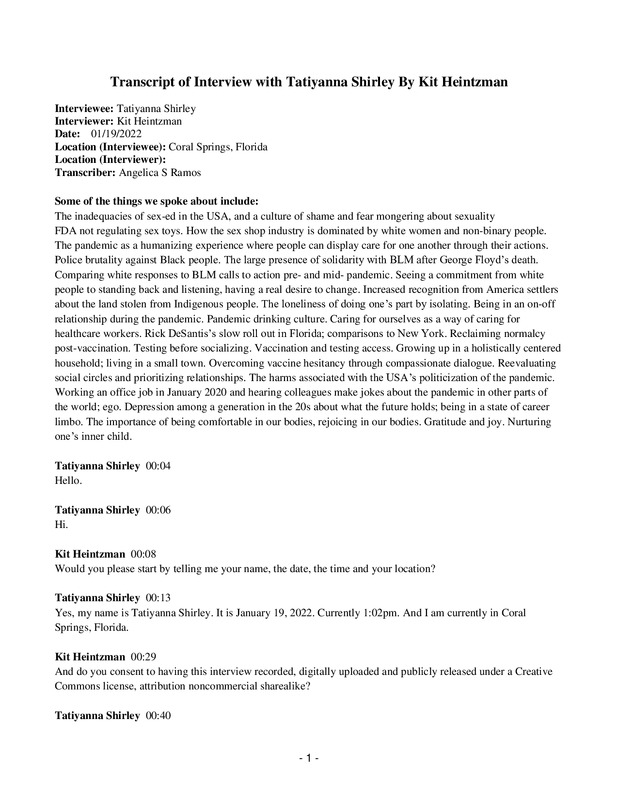
2022-01-19
Self Description:
“My name is Tatiyanna I’m a born and raised Floridian. I started a brand [Ardently] about two years ago. January actually, so the 2 year mark is right around the corner actually. January 2020, that was a few months before the pandemic hit, so I was very excited to start a business. I went in with no idea what I was really doing. I did some research, but overall it was my first time starting a business. And then 2 months later a pandemic hit and everything started to get really really weird for me. Especially as I was starting to navigate new territory as a business owner. And then what that looked like for a business owner during a pandemic. So, that’s a little bit about me… It’s an online business for adult toys, adult novelties, which is a really interesting field to get into especially…, actually something funny is that when the pandemic hit it was very frightening, and at the time I realized, eventually I came to realize that adult toys was a great industry to go into because no one had anything to do really except masturbate because no one was seeing each other, everyone was social distancing, and everyone was home bored, and so a lot of people ended up getting into their sexuality and exploring sexually. And there is research that shows the spike that the pandemic caused for sexual exploration. So that was honestly a pleasant surprise when I got into this industry; because trust me, that’s not what I was thinking. And I wanted everyone to masturbate more. I also talk about sexual wellness and I give sex advice and self-love advice and tips like that. So, you know, as I’m trying to understand how will I get people to be more comfortable in their skin, to want to explore their sexuality, their identities, their pleasure, and low and behold: everyone is at home and they’re touching themselves.”
-
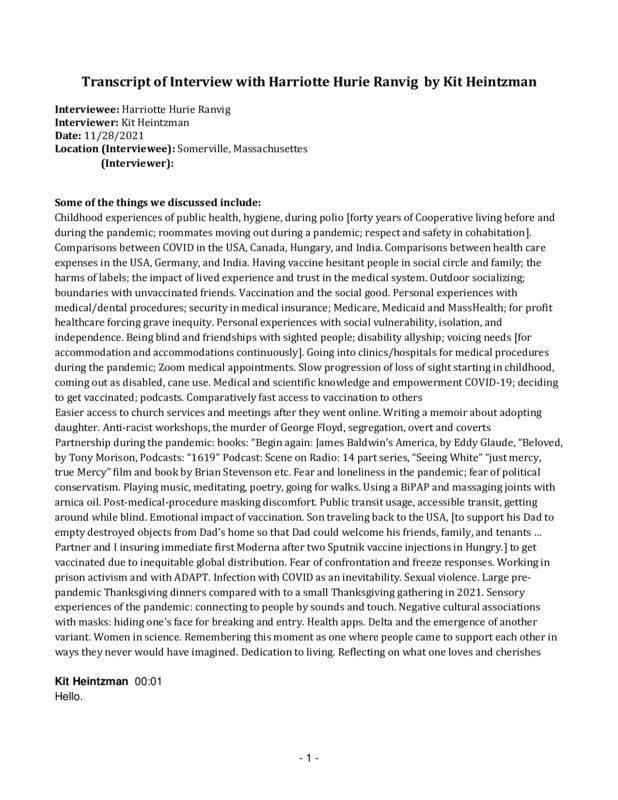
2021-11-28
Self-Description:
“I am 75 years-old and very comfortable with my age and my body. Not that the body is perfect, but I’m comfortable with it. I started losing my sight when I was 6 years old in the spring of my first grade year, in public school in Valdosta, Georgia. It was from a fall where I bumped the back of my head. I was already wearing glasses for being near-sighted, and the peculiar thing was I had a terrible headache and they checked me for concussion. But, as it turns out I had a full detachment from the right eye, which I as a child was not particularly aware of therefore it went untreated for quite some weeks. I lost the sight fully then with the right eye. Managed pretty well the left eye, except I had some cataracts and apparently a gradually detaching retina as well. I guess I saw colors and shapes until I was 11 or maybe 12. Difficult to remember, but I treasured light perception. And locating myself by paying attention to where windows were in any new space I was in. Apparently I could see enough to navigate a school 700 kids when I first went to Atlanta for 1 or 2 years to learn braille at what was then called the beginnings of mainstreaming… learning some skills for being blind, which at that time, I didn’t identify with at all. I laughingly say, “I was hard-of-seeing”. Mostly I didn’t get isolated except for some playground activities like softball, but on the other hand we also had ethnic dancing. And of course I sang at every opportunity. I also had private piano lessons, but had a horrible teacher, so that went by the way until high school. I tried to learn guitar, but my little fingers hurt too much. So, ostensibly I was homeschooled for five years as the youngest of the [four] children [in my family].
“I was homeschooled by my mother, in a sense by my father who read to me quite advanced things, like Dickens. And I also learned to touch type thanks to my mother’s color coded poster that I could manage to learn the home keys, probably the most major skill I got in my childhood. Let’s just say by the age of even 11 or 12 I’m sure I was more than legally blind, and I would consider myself blind by age 14 or 15, and I had light perception until I was 40. I didn’t actually perceive myself as “disabled” even as a blind person, because I thought being disabled meant –as a blind person–everything was all dark. And as I’ve already related, things were not all dark for me. So I never assumed, and this is certainly because I’m white and I grew up, my father was from poverty. My mother was from some inherited wealth, not really, very poor as a child. [from age 8 to 14 years old she lived in boarding houses with her mom who seem to become more and more delusional over time until her mom was committed to a state mental institution.]
“[Mom’s great aunts became her guardians.] when she started high school. [Thanks to her great aunts,] she had sufficient money to go to college. I was so lucky that my father was very successful, and one of his key goals was that his children, he could pay for excellent education, [for private high schools], at least through their Bachelors degree. And, that in itself in the 1950s and 1960s is pretty astounding. So after these two years I went off to a tiny boarding school where I was the first, maybe the only, blind student, and I think what strengthened me to be in the world as a person who was blind “disabled” was a certain confidence and joy that my mother certainly imbued in me, my father too to a degree, but my mother primarily. It was just second nature to me to teach my teachers and fellow students how to walk with me, how to work out assignments with me, etc. etc., because even though I learned braille, you couldn’t get any current literature that you just wanted to read in braille…. I was the first blind student in over 110 years when I went to Antioch College, and I went there because they promised a year in Europe and work experience in co-op jobs. And even though I got into Radcliffe, I turned them down like a 17-year-old naive girl might just do. I really never thought there was anything I could not do, and mama just had a belief that if you worked hard enough at a dream somehow you might be able to realize it. I was a folky too, I played guitar…
“I feel as though I’ve had 7 lifetimes in a lifetime. I’ve been married and divorced three times. Two of those times very amicably, and I’m close friends with both (of them. [My third husband was a dear friend young Indian who as a friend and lover of my husband who struggled deeply with depression. With out this friend, I have grave doubts we could have completed the 18 month legal and actual journey in India.] My first husband [introduced me to classical Hindustani music in north India, which made it possible for me to become a performer and teacher; the love of it has nourished me to the completion of my dissertation in 2009 and beyond] has been an important feature of my life, certainly up to the completion of my dissertation in ethnomusicology in 2009. I had two children with my second husband. The first was our biological son in ’85, and then we wanted a second child. But when he was an infant I had a herniated lumbar disk, and was kind of put out of work and everything else for four months. I decided I really wanted to save my body’s energy and adopt an Indian daughter. We managed to do that. We went back To India on my senior music research in (1989-91). I should say one last bit about that [earlier part of my life; just prior to the senior research grant period, I worked for five years] at the Massachusetts Office on Disability, then so ridiculously named the State Office of Handicapped Affairs. I mention that here because in the last 8 years I’ve returned to disability advocacy, I’ve taken it on as a real personal and volunteer activity, in a strong cross-disability fashion. So for example National ADAPT and Massachusetts ADAPT, especially National, was very much focused on individuals who were and are wheelchair users and often in need of certain amounts, or many hours, of personal care attendants [as well as affordable and accessible housing.] I think I might be one of two blind people in a national organization that I’m aware of. I’ve taken on civil rights non-violent actions [recently in the effort to keep the affordable care Act,] until the pandemic. [I enjoy playing traditional tunes on the recorder.] That’s how I met my true love Frank 18 years ago. He himself is 29-years my junior, but somehow age hasn’t gotten in our way. Leading a course in the prisons until the pandemic for three years on leadership and transformational thinking. It’s music at home. Enjoyment of cooking and in the kitchen. And yogurt and sourdough bread. I have had a [part time secretary] consistently since 1979, although during the pandemic I lost one for the whole year. Now I have a great one. Oh and I have been a volunteer doula [for friends, 15 times from 1989-2006].”
NB: Square brackets indicate Harriotte’s additions, some of which are not present in the interview but are a part of her story
Some of the things we talked about included:
Childhood experiences of public health, hygiene, during polio
[forty years of Cooperative living before and during the pandemic; roommates moving out during a pandemic; respect and safety in cohabitation]
Comparisons between COVID in the USA, Canada, Hungary, and India
Comparisons between health care expenses in the USA, Germany, and India
Having vaccine hesitant people in social circle and family; the harms of labels; the impact of lived experience and trust in the medical system
Outdoor socializing; boundaries with unvaccinated friends
Vaccination and the social good
Personal experiences with medical/dental procedures; security in medical insurance; Medicare, Medicaid and MassHealth; for profit healthcare forcing grave inequity
Personal experiences with social vulnerability, isolation, and independence
Being blind and friendships with sighted people; disability allyship; voicing needs [for accommodation and accommodations continuously]
Going into clinics/hospitals for medical procedures during the pandemic; Zoom medical appointments
Slow progression of loss of sight starting in childhood, coming out as disabled, cane use
Medical and scientific knowledge and empowerment COVID-19; deciding to get vaccinated; podcasts
Comparatively fast access to vaccination to others
Easier access to church services and meetings after they went online
Writing a memoir about adopting daughter
Anti-racist workshops, the murder of George Floyd, segregation, overt and coverts
Partnership during the pandemic: books: “Begin again: James Baldwin’s America, by Eddy Glaude, “Beloved, by Tony Morison, Podcasts: “1619” Podcast: Scene on Radio: 14 part series, “Seeing White” “just mercy, true Mercy” film and book by Brian Stevenson etc
Fear and loneliness in the pandemic; fear of political conservatism
Playing music, meditating, poetry, going for walks
Using a BiPAP and massaging joints with arnica oil
Post-medical-procedure masking discomfort
Public transit usage, accessible transit, getting around while blind
Emotional impact of vaccination
Son traveling back to the USA, [to support his Dad to empty destroyed objects from Dad’s home so that Dad could welcome his friends, family, and tenants … Partner and I insuring immediate first Moderna after two Sputnik vaccine injections in Hungry.]
to get vaccinated due to inequitable global distribution
Fear of confrontation and freeze responses
Working in prison activism and with ADAPT
Infection with COVID as an inevitability
Sexual violence
Large pre-pandemic Thanksgiving dinners compared with to a small Thanksgiving gathering in 2021
Sensory experiences of the pandemic: connecting to people by sounds and touch
Negative cultural associations with masks: hiding one’s face for breaking and entry
Health apps
Delta and the emergence of another variant
Women in science
Remembering this moment as one where people came to support each other in ways they never would have imagined
Dedication to living
Reflecting on what one loves and cherishes
Cultural references: Alexander (Technique (lessons, *the joy of learning poised relaxed movement in my body* , Amy Coney, Barrett, Arlington Street Church (Boston) , MA, USA), Eddie Glaude, Gone with the Wind, Edith Hamilton’s Book of Mythology, Gabor Maté’s The Wisdom of Trauma, Henrietta Lacks, Institute for Survival and Beyond, James Baldwin, Joanna Macey’s book “World as Lover” (1991), Katelin Kariko, Maya Angelou, NPR, Paul Farmer, Rachel Cargle’s Do The Work Course 30-Day Challenge, RadioLab, Robert Mcfarland’s The Old Ways (2012), Section8, This Week in Virology, YouTube, Young Adult Novels, Zoom
-
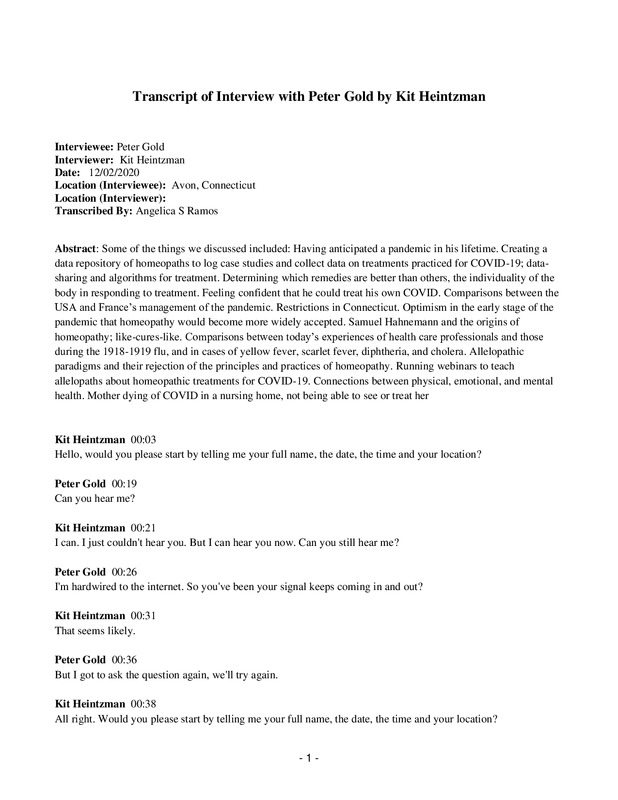
2020-12-02T14:08
Self-description:
“I am currently the senior staff person for the American Institute of Homeopathy. The American Institute of Homeopathy is the oldest medical society in the United State, predating the American Medical Association by approximately 3 years. I have served the homeopathic community in a variety of capacities over the past 15 or so years. Helping the National Center for Homeopathy, The Academy of Veterinary Homeopathy, The Canadian Academy of Homeopathy, and other organizations—particularly with respect to research, communications, and outreach. I’m a biologist by training. I have been involved with homeopathy since the late 1990s, very extensively. I’ve trained to better understand homeopathy. I actually spent 15 years training in the field. So, I understand the practice of homeopathy very well.”
Some of the things we discussed included:
Having anticipated a pandemic in his lifetime
Creating a data repository of homeopaths to log case studies and collect data on treatments practiced for COVID-19; data-sharing and algorithms for treatment
Determining which remedies are better than others, the individuality of the body in responding to treatment
Feeling confident that he could treat his own COVID
Comparisons between the USA and France’s management of the pandemic
Restrictions in Connecticut
Optimism in the early stage of the pandemic that homeopathy would become more widely accepted
Samuel Hahnemann and the origins of homeopathy; like-cures-like
Comparisons between today’s experiences of health care professionals and those during the 1918-1919 flu, and in cases of yellow fever, scarlet fever, diphtheria, and cholera
Allelopathic paradigms and their rejection of the principles and practices of homeopathy
Running webinars to teach allelopaths about homeopathic treatments for COVID-19
Connections between physical, emotional, and mental health
Mother dying of COVID in a nursing home, not being able to see or treat her
-
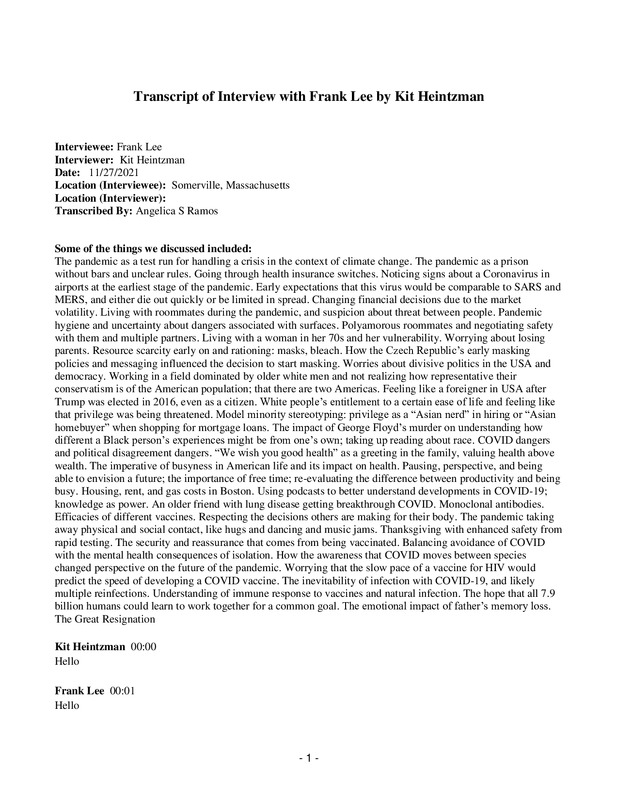
2021-11-27
Self-description:
“I consider myself a young professional even though I’m middle aged, in my 40s. I work in technology. Specifically, I’m a chip designer. I design chips that go into power supplies and battery chargers. I’m in the process of transitioning fields; learning to become a biologist. Studying biology at a DIY biomarker space, since there are such things now. It’s really awesome. My inspiration for doing that is to work on climate change mitigation, [for] which my intuition says biology will be very important. I’m fairly certain that we’re going to get the zero carbon grid, I feel that there are many smart people working on that and that we will absolutely get there, even though it will be hard, but I don’t see enough people working on getting rid of all the extra carbon dioxide we’ve put into the atmosphere since 1750, since the [Industrial Revolution, half] of which I believe we’ve put in the atmosphere since 1980, kind of scary. So that’s where I come from. Since I’ve been a professional, I’m a higher earner than the average person. That gives me a lot more time and flexibility to pursue other things.”
Some of the things we discussed included:
The pandemic as a test run for handling a crisis in the context of climate change
The pandemic as a prison without bars and unclear rules
Going through health insurance switches
Noticing signs about a Coronavirus in airports at the earliest stage of the pandemic
Early expectations that this virus would be comparable to SARS and MERS, and either die out quickly or be limited in spread
Changing financial decisions due to the market volatility
Living with roommates during the pandemic, and suspicion about threat between people
Pandemic hygiene and uncertainty about dangers associated with surfaces
Polyamorous roommates and negotiating safety with them and multiple partners
Living with a woman in her 70s and her vulnerability. Worrying about losing parents
Resource scarcity early on and rationing: masks, bleach
How the Czech Republic’s early masking policies and messaging influenced the decision to start masking
Worries about divisive politics in the USA and democracy
Working in a field dominated by older white men and not realizing how representative their conservatism is of the American population; that there are two Americas
Feeling like a foreigner in USA after Trump was elected in 2016, even as a citizen
White people’s entitlement to a certain ease of life and feeling like that privilege was being threatened
Model minority stereotyping: privilege as a “Asian nerd” in hiring or “Asian homebuyer” when shopping for mortgage loans
The impact of George Floyd’s murder on understanding how different a Black person’s experiences might be from one’s own; taking up reading about race
COVID dangers and political disagreement dangers
“We wish you good health” as a greeting in the family, valuing health above wealth
The imperative of busyness in American life and its impact on health
Pausing, perspective, and being able to envision a future; the importance of free time; re-evaluating the difference between productivity and being busy
Housing, rent, and gas costs in Boston
Using podcasts to better understand developments in COVID-19; knowledge as power
An older friend with lung disease getting breakthrough COVID
Monoclonal antibodies
Efficacies of different vaccines
Respecting the decisions others are making for their body
The pandemic taking away physical and social contact, like hugs and dancing and music jams
Thanksgiving with enhanced safety from rapid testing
The security and reassurance that comes from being vaccinated
Balancing avoidance of COVID with the mental health consequences of isolation
How the awareness that COVID moves between species changed perspective on the future of the pandemic
Worrying that the slow pace of a vaccine for HIV would predict the speed of developing a COVID vaccine
The inevitability of infection with COVID-19, and likely multiple reinfections
Understanding of immune response to vaccines and natural infection
The hope that all 7.9 billion humans could learn to work together for a common goal
The emotional impact of father’s memory loss
The Great Resignation
Other cultural references: CVS, YouTube, Czech Masking PSA (https://www.youtube.com/watch?v=2_WxtSavZR4), This Week in Virology podcast ( https://www.microbe.tv/twiv/), Zoom, Signal, Slack, Discord, contra dancing, Frank Ostaseski’s book The Five Invitations (2017)
See also: My online laboratory notebooks at https://notebooks.ElectrifiedResearch.com/home/franklee and https://notebooks.ElectrifiedResearch.com/boslab
-
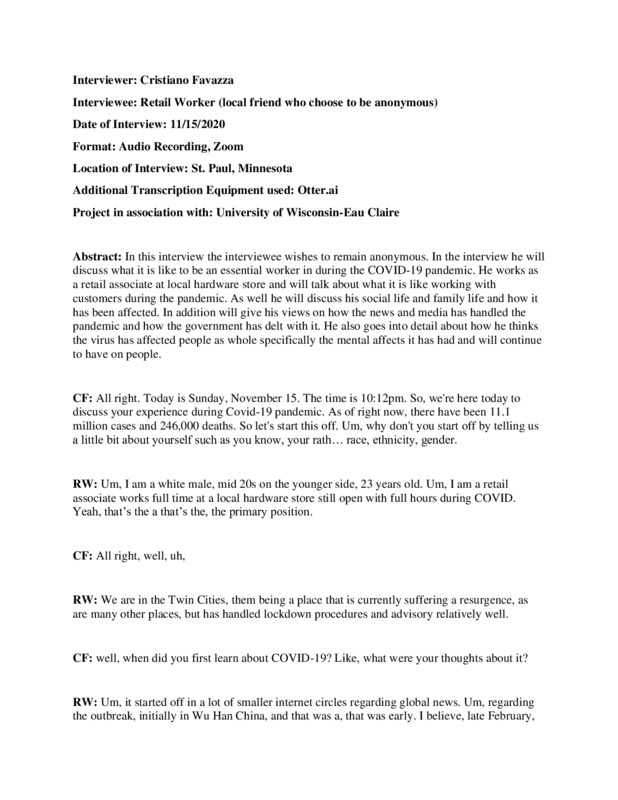
11/15/2020
C19OH
-
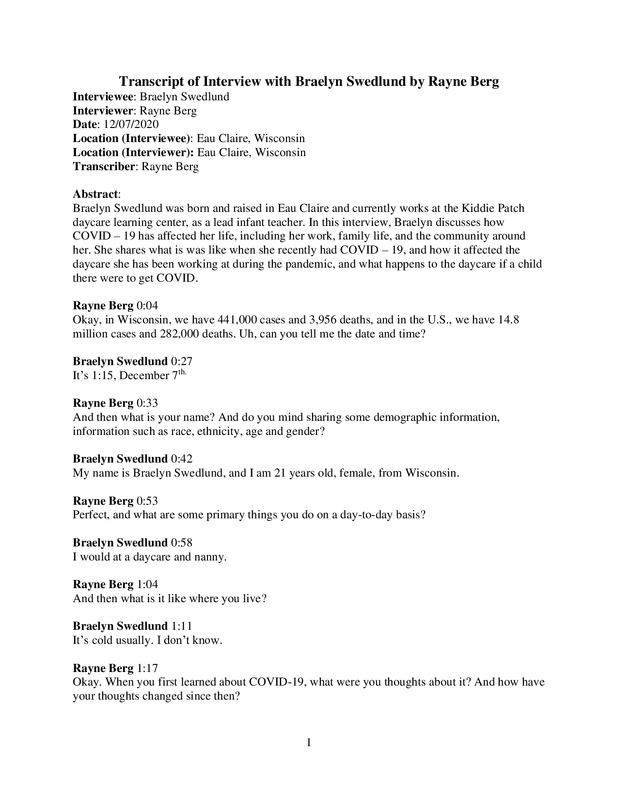
12/11/2020
Braelyn Swedlund was born and raised in Eau Claire and currently works at the Kiddie Patch daycare learning center, as a lead infant teacher. In this interview, Braelyn discusses how COVID – 19 has affected her life, including her work, family life, and the community around her. She shares what is was like when she recently had COVID – 19, and how it affected the daycare she has been working at during the pandemic, and what happens to the daycare if a child there were to get COVID.
-
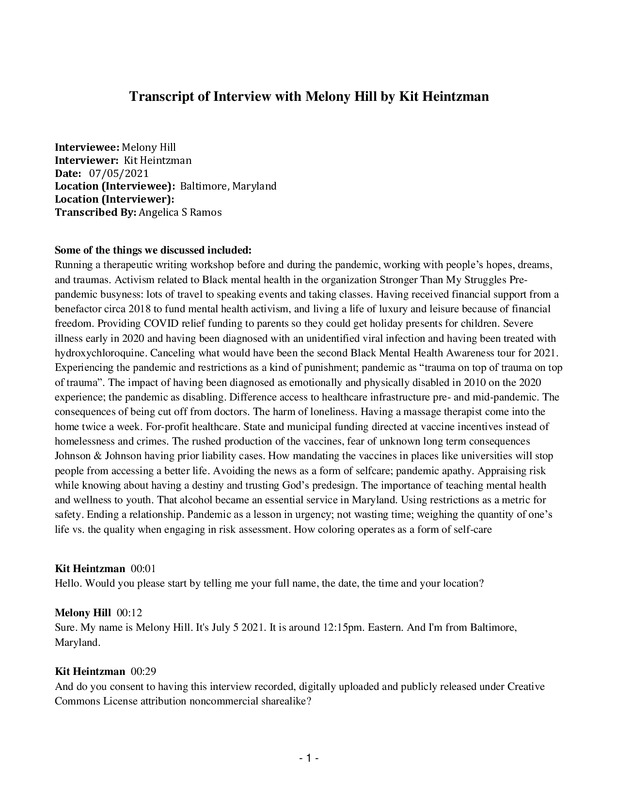
2021-07-05
Self-description: “Hi there, I’m Melony Hill. I’m a life-transition coach and trauma survivor from Baltimore, Maryland. I’m really focused on mental health and the pandemic really really stretched my ability to deal with the way that I had been dealing with my mental health.”
-
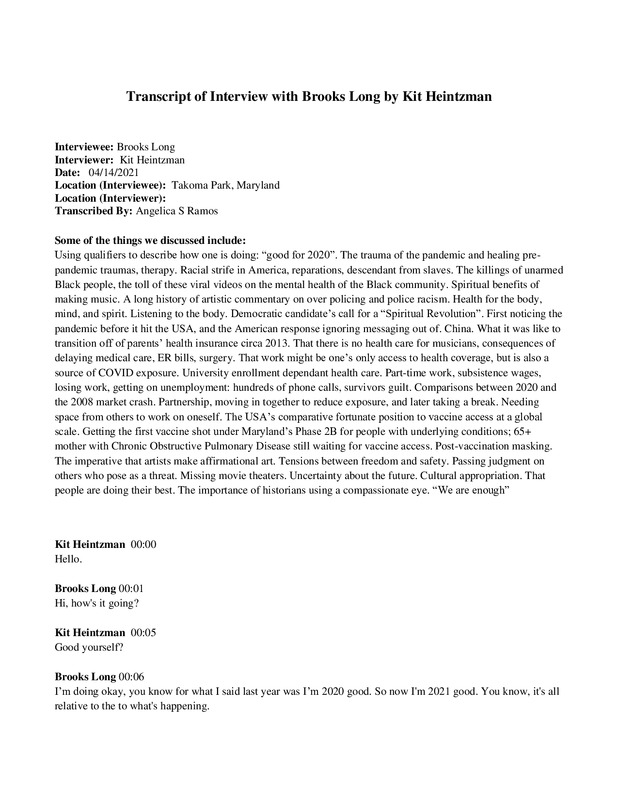
2021-04-14
Some of the things we discussed included:
Using qualifiers to describe how one is doing: “good for 2020”
The trauma of the pandemic and healing pre-pandemic traumas, therapy
Racial strife in America, reparations, descendant from slaves
The killings of unarmed Black people, the toll of these viral videos on the mental health of the Black community
Spiritual benefits of making music
A long history of artistic commentary on over policing and police racism
Health for the body, mind, and spirit
Listening to the body
Democratic candidate’s call for a “Spiritual Revolution”
First noticing the pandemic before it hit the USA, and the American response ignoring messaging out of China
What it was like to transition off of parents’ health insurance circa 2013
That there is no health care for musicians, consequences of delaying medical care, ER bills, surgery
That work might be one’s only access to health coverage, but is also a source of COVID exposure
University enrollment dependant health care
Part-time work, subsistence wages, losing work, getting on unemployment: hundreds of phone calls, survivors guilt
Comparisons between 2020 and the 2008 market crash
Partnership, moving in together to reduce exposure, and later taking a break
Needing space from others to work on oneself
The USA’s comparative fortunate position to vaccine access at a global scale
Getting the first vaccine shot under Maryland’s Phase 2B for people with underlying conditions; 65+ mother with Chronic Obstructive Pulmonary Disease still waiting for vaccine access
Post-vaccination masking
The imperative that artists make affirmational art
Tensions between freedom and safety
Passing judgment on others who pose as a threat
Missing movie theaters
Uncertainty about the future
Cultural appropriation
That people are doing their best
The importance of historians using a compassionate eye
“We are enough”
Other cultural references:
Creative Alliance, Disney, NLF, MLB, Zoom, Scam Calls, Louis Jordan’s “Saturday Night Fish Fry”, Marvin Gay, Ma Rainey, The Music Box Radio, Domino’s Pizza, Twitter, 9/11, Nina Simone, James Baldwin documentary I’m Not Your Negro (2016), Transcendental Meditation Practice, Tara Brach’s book Radical Acceptance (2003), Marshall Rosenberg’s book Nonviolent Communication (1999).
-
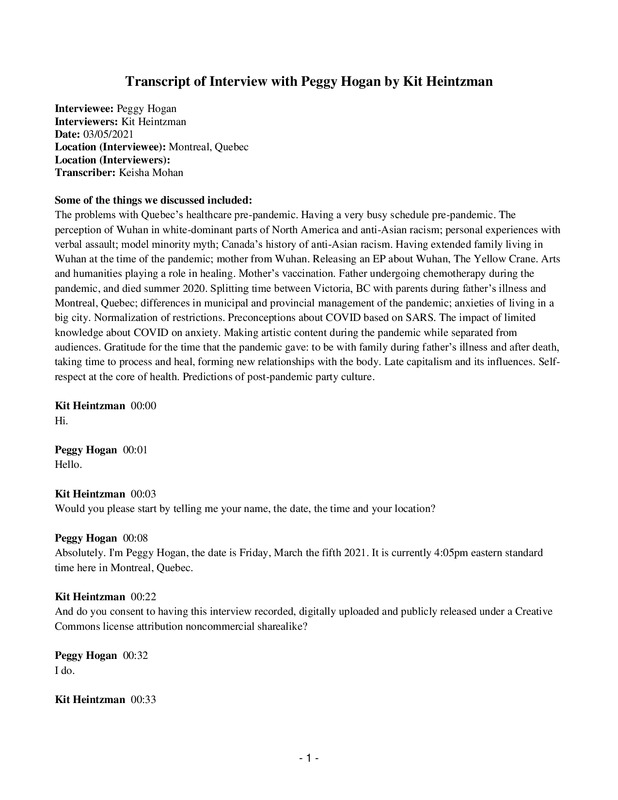
2021-03-05T16:05
Self-introduction:
“My name’s Peggy Hogan. I’m a Chinese-Canadian recording artist that goes by Hua Li. And I’m also a music educator and researcher, and I am the current symposium director for Pop Montreal International Music Festival.”
-
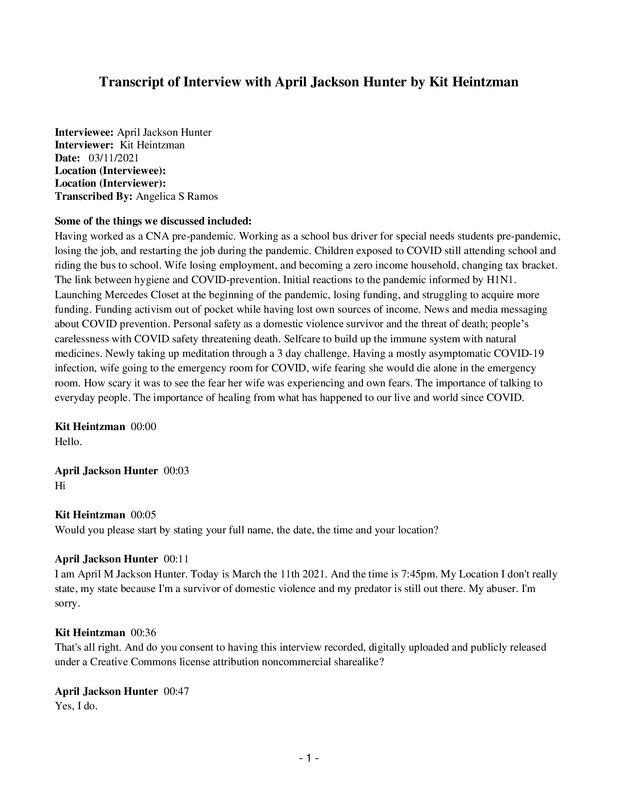
2021-03-11
Self-description:
“My name is April-Jackson Hunter. I’m an award winning author and the founder and president of Mercedes Closet Inc., which is a non-profit geared to empowering survivors in the LGBTQ community of violence. And I’m a survivor of COVID-19.”
Some of the things we talked about included:
Having worked as a CNA pre-pandemic
Working as a school bus driver for special needs students pre-pandemic, losing the job, and restarting the job during the pandemic
Children exposed to COVID still attending school and riding the bus to school
Wife losing employment, and becoming a zero income household, changing tax bracket
The link between hygiene and COVID-prevention
Initial reactions to the pandemic informed by H1N1
Launching Mercedes Closet at the beginning of the pandemic, losing funding, and struggling to acquire more funding
Funding activism out of pocket while having lost own sources of income
News and media messaging about COVID prevention
Personal safety as a domestic violence survivor and the threat of death; people’s carelessness with COVID safety threatening death
Selfcare to build up the immune system with natural medicines
Newly taking up meditation through a 3 day challenge
Having a mostly asymptomatic COVID-19 infection, wife going to the emergency room for COVID, wife fearing she would die alone in the emergency room
How scary it was to see the fear her wife was experiencing and own fears
The importance of talking to everyday people
The importance of healing from what has happened to our live and world since COVID
-
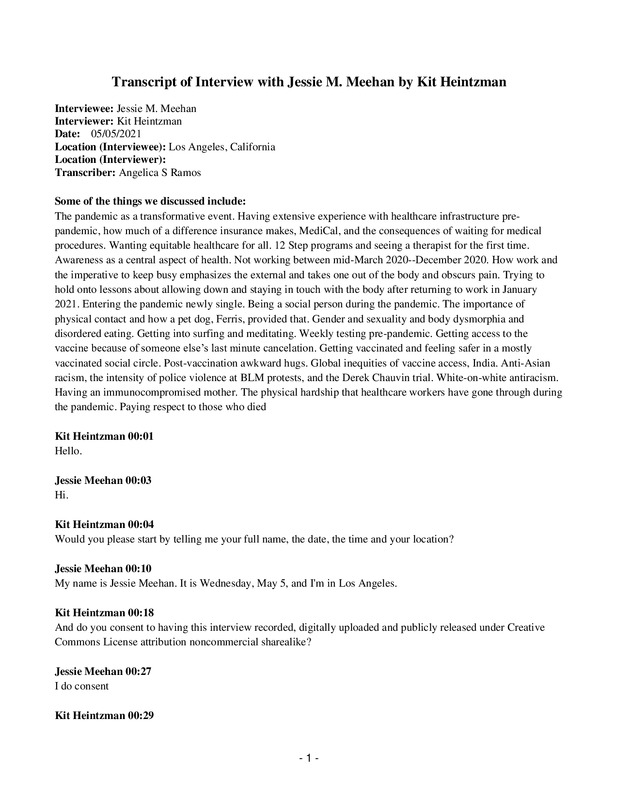
2021-05-05
Self-description:
“I’m a queer female. And, I’m in a band called WASI and, you know, we’ve been playing together for quite some time. And It’s a lot of fun, electronic, kind of punky. I also work in television as a set dresser. That’s pretty much what I’m up to. I’m a big advocate for queer visibility, out in life, in work, everywhere. And having safe spaces, my band is very much about safe spaces.”
-
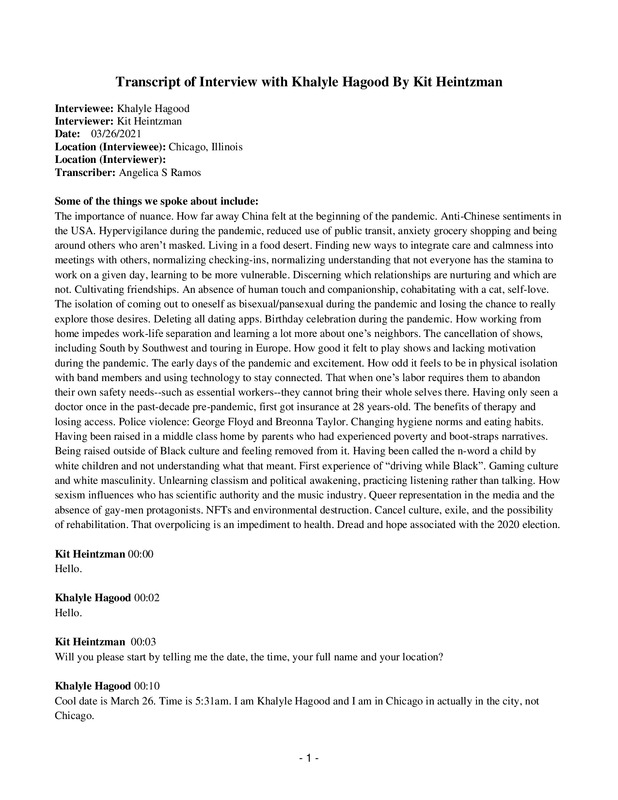
2021-03-26
Self description:
“I’m 30. I’ve been in Chicago since winter 2013, so I’m not a native. I’m from down state. I work a fulltime job. I’m in 5 bands. I live by myself. I live in... probably one of the less desirable neighbours, the neighbourhoods my grandma would probably be upset about, even though I love living here. I make money above the poverty line.” Performs in the following bands: Bussy Kween Power Trip, Gilt Drip, Cordoba, The Devonns, DXTR SPITS.
-
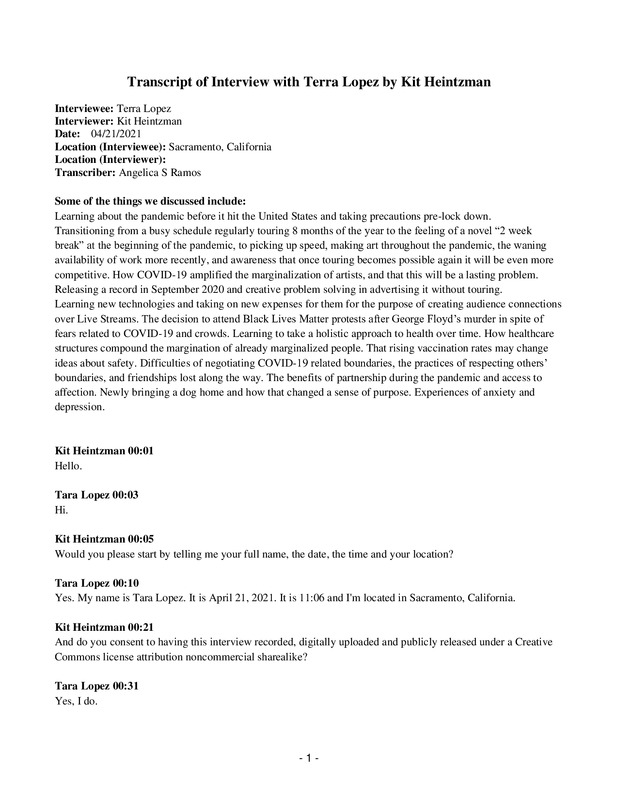
2021-04-21
Lopez’s self-description: “I am a full-time musician, a touring artist, a recording artist, along with being a music publicist.”
-
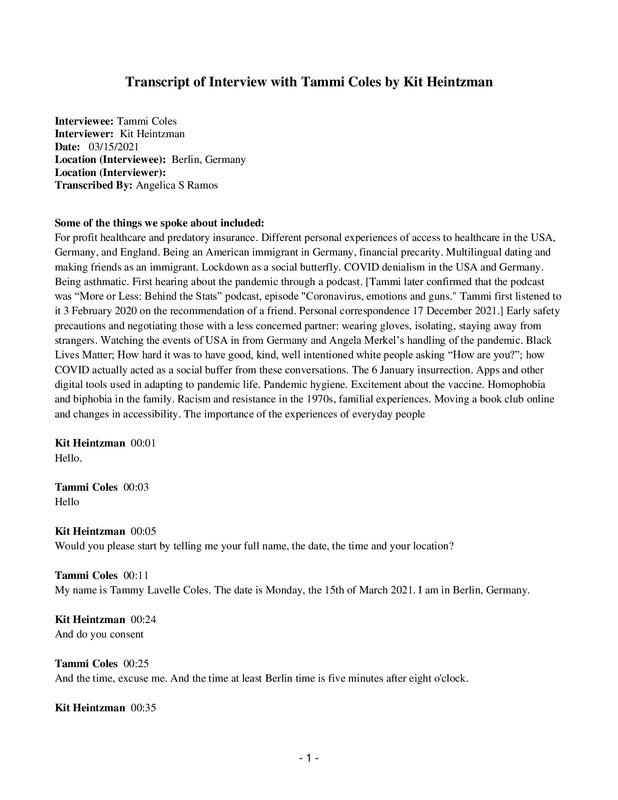
2021-03-15
Self-description: “My name is Tammi. I am a US citizen, and I have been living in Berlin, Germany since 2006. I am an immigrant and that definitely shapes my experience these days. I arrived when I was in my late-30s…, now I’m in my 50s. I’m African American. I am bisexual queer. I am polyamorous. Twice married. Twice divorced. Living with my cis white German partner, straight boy, who I met here in Germany. I guess now it’s been about 4 or 5 years. I’m living here with him, I think that will also inform some of the things I have to say about my experience under COVID.”
Some of the things we spoke about included:
For profit healthcare and predatory insurance
Different personal experiences of access to healthcare in the USA, Germany, and England
Being an American immigrant in Germany, financial precarity
Multilingual dating and making friends as an immigrant
Lockdown as a social butterfly
COVID denialism in the USA and Germany
Being asthmatic
First hearing about the pandemic through a podcast. [Tammi later confirmed that the podcast was “More or Less: Behind the Stats” podcast, episode "Coronavirus, emotions and guns." Tammi first listened to it 3 February 2020 on the recommendation of a friend. Personal correspondence 17 December 2021.]
Early safety precautions and negotiating those with a less concerned partner: wearing gloves, isolating, staying away from strangers
Watching the events of USA in from Germany and Angela Merkel’s handling of the pandemic
Black Lives Matter; How hard it was to have good, kind, well intentioned white people asking “How are you?”; how COVID actually acted as a social buffer from these conversations
The 6 January insurrection
Apps and other digital tools used in adapting to pandemic life
Pandemic hygiene
Excitement about the vaccine
Homophobia and biphobia in the family
Racism and resistance in the 1970s, familial experiences
Moving a book club online and changes in accessibility
The importance of the experiences of everyday people
Other cultural references: Aunt Jemima Pancake Syrup, Washington Redskins, Zoom, George Floyd, Netflix, Habitica, FocusMate, Tamagotchi, Body Doubling Technique, Gettysburg, More or Less: Behind the Stats podcast
-
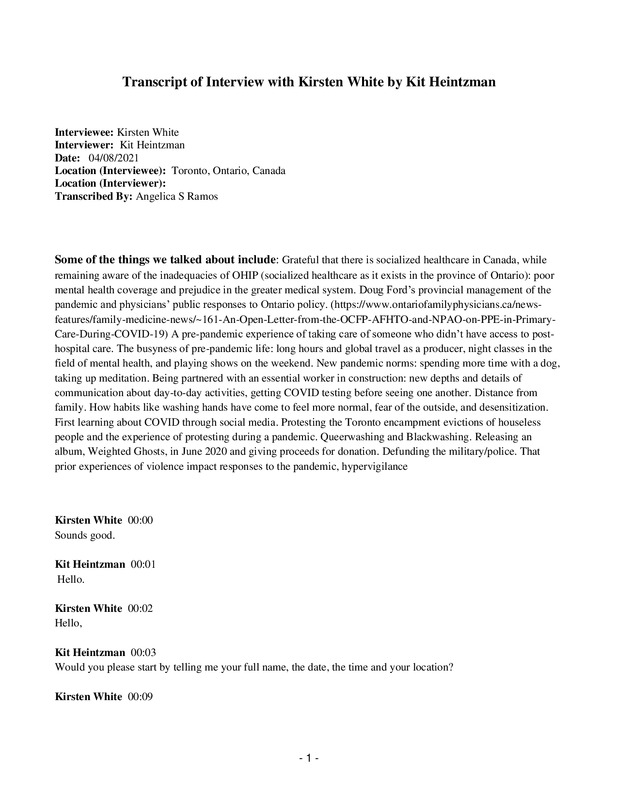
2021-04-08
Self-description: “I’m a pansexual, white, female, colonizing Toronto. I’m a commercial producer and a psychotherapist in training. I also play hardcore and metal music, and front two bands in that genre. I’m a staunch feminist and a supporter of antifa, and love all living breathing things.”
-
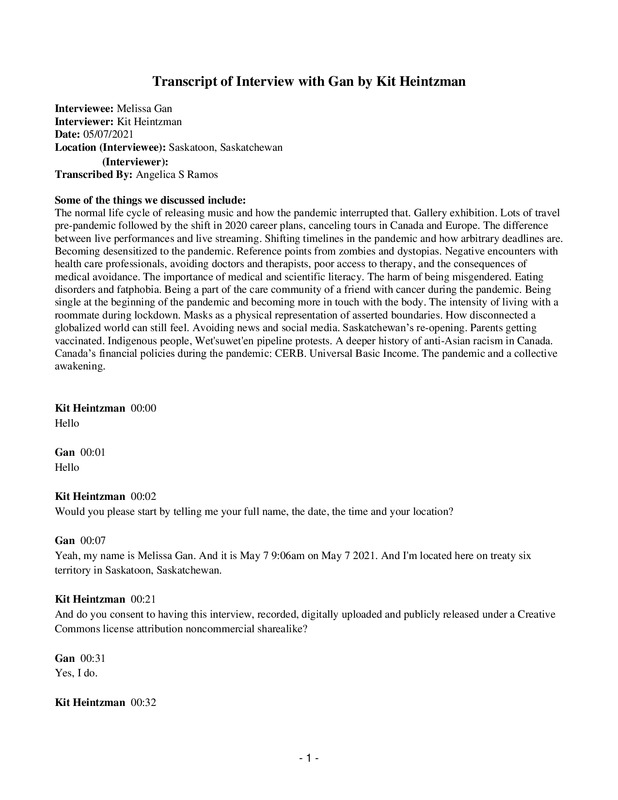
2021-05-07
Self Description - “I go by gan. I identify as agender, or just like don’t identify with any gender. I am 30-years-old. I am Chinese-Malaysian. My parents are immigrants from Malaysia, so I’m first or second generation, however people classify that. I’m a settler on indigenous land. And I have somehow become a full time musician/artist and it’s a very permeable kind of space, but I’ve moved between doing musical performance, composition, some sorts of writing or like installation kinds of things; it’s just a very open space to explore. My upbringing was in a mostly middle class kind of family. My dad is a civil engineer, I would say in my childhood we were much more strapped for money than we are now, and a big part of that is because of his education. And, my mom is a homemaker. I have one older brother as well, who works in chemistry and lab technology.”
-
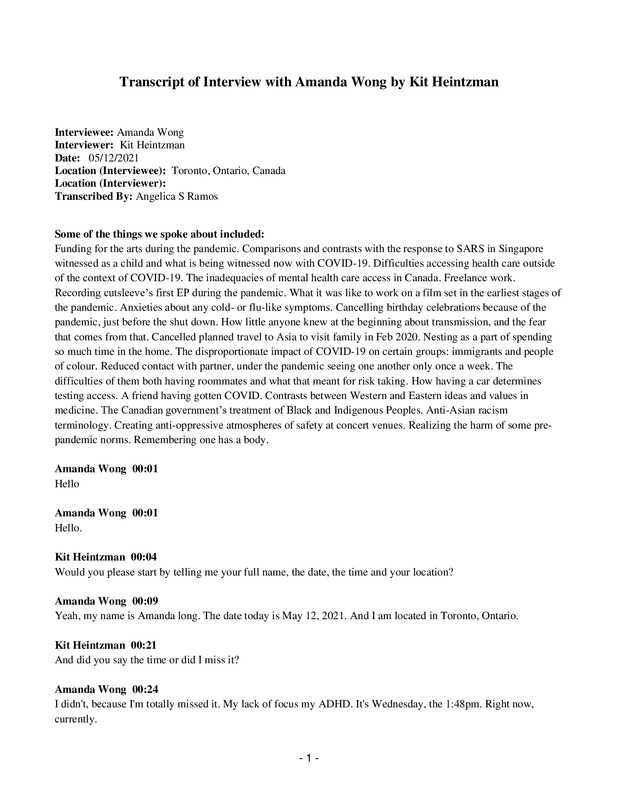
2021-05-12
Self Description: “My name is Amanda Wong. I am a member of the band cutsleeve. We are an all queer, East Asian, alt-rock band, based here in Toronto. On the side I am also a filmmaker and a sound artist. I am an immigrant here to Canada; I moved here when I was 12.”
-
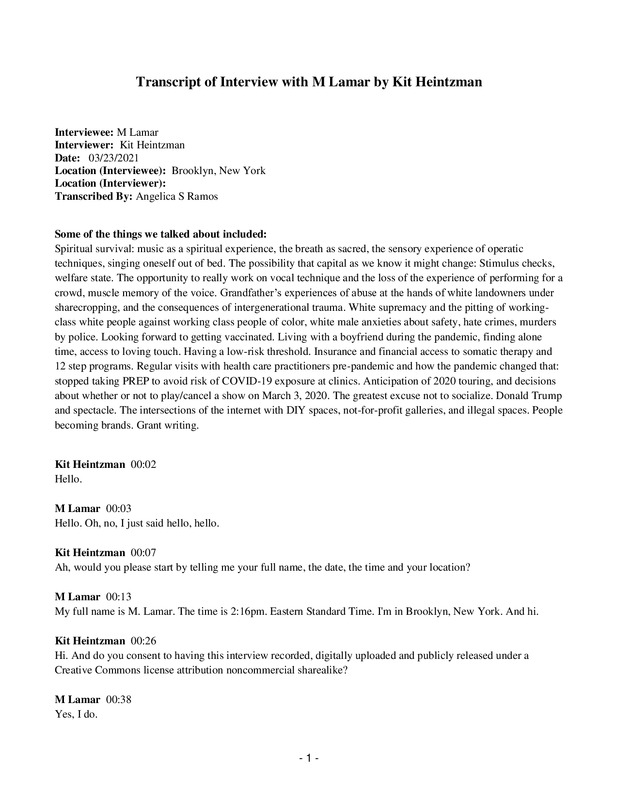
2021-03-23
Self-description: “My name is M. Lamar. I make music, primarily. I make video, film. I sometimes engage in art installation kinds of practices within art galleries and art spaces. I’m also in pre-production in two documentary films that I’m directing. A very motivating pull in my creative life for a very very long time. And so, I would love to encourage anyone who might be listening at any point in history to investigate my work. I have no faith that it will exist in 50 years, but you can find me on Spotify, Amazon Music, iTunes, all those places, YouTube. I don’t know if those places will exist in 50 years, but my work is found in all of those places. If you’re interested in a sort of... how would you describe what I do? Negrogothic music. I’m a male soprano/countertenor or a male treble voice. I play piano. I make longform pieces about any number of difficult subjects, like, say, the transatlantic slave trade or the persistence of police murder of unarmed Black people, and if you know Funeral Doom Spiritual, The Slave Ship, and Requiem Speculum Orum: Shackled to the Dead. I have a piece called Lordship Bondage The Birth of the Negro Superman which is about transcendence and spiritual awakening in the context of extreme dehumanization in the context of imperialist, western, capitalism, patriarchy. That album is a collaboration with the classical duo The Living Earth Show.”
-
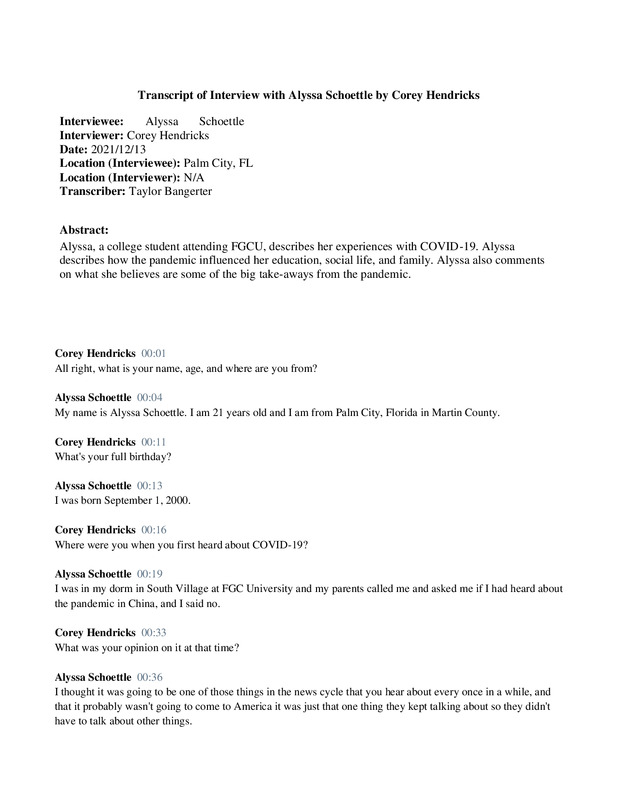
2021-12-13T10:15:01
An interview with FGCU student Alyssa Schoettle on her experiences with COVID-19.
-
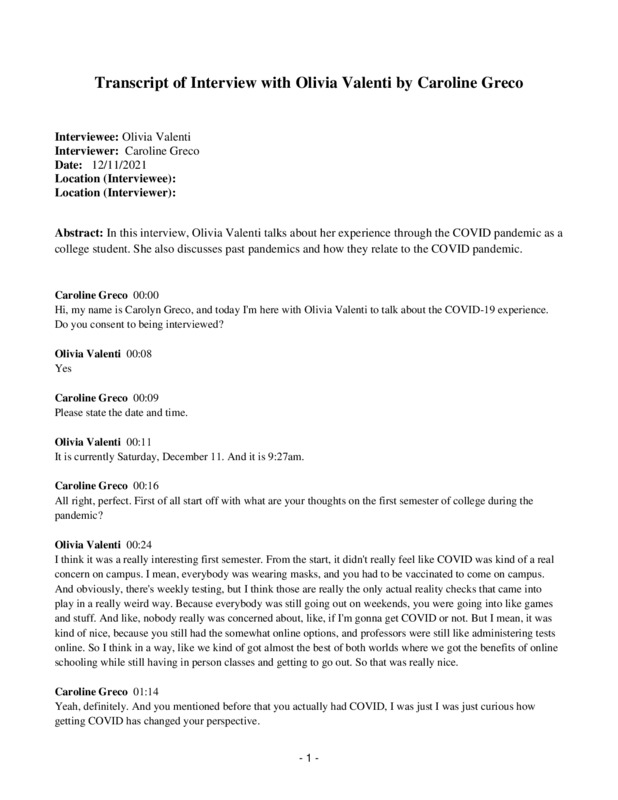
2021-12-11
It illustrates what college was like during the pandemic
-
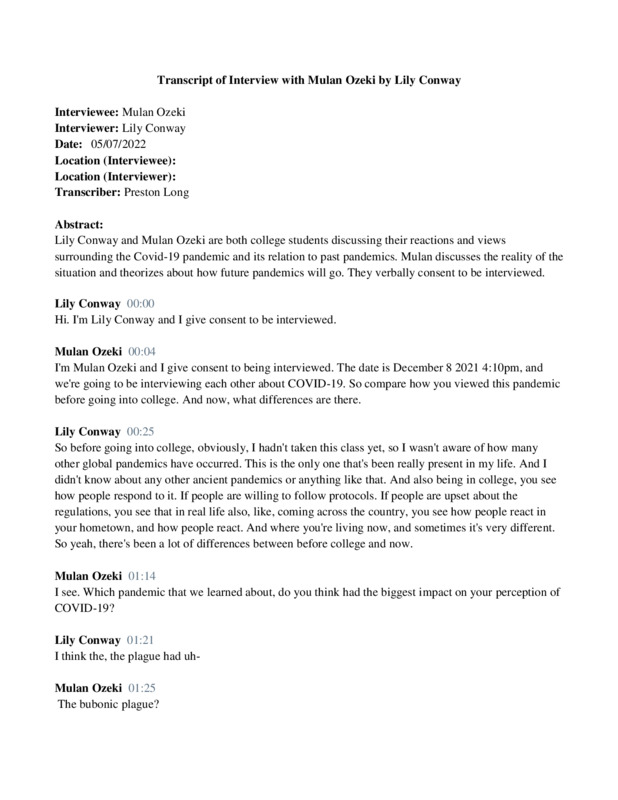
2021-12-08
It says how educating yourself on the past can always provide insight on current struggles.
-
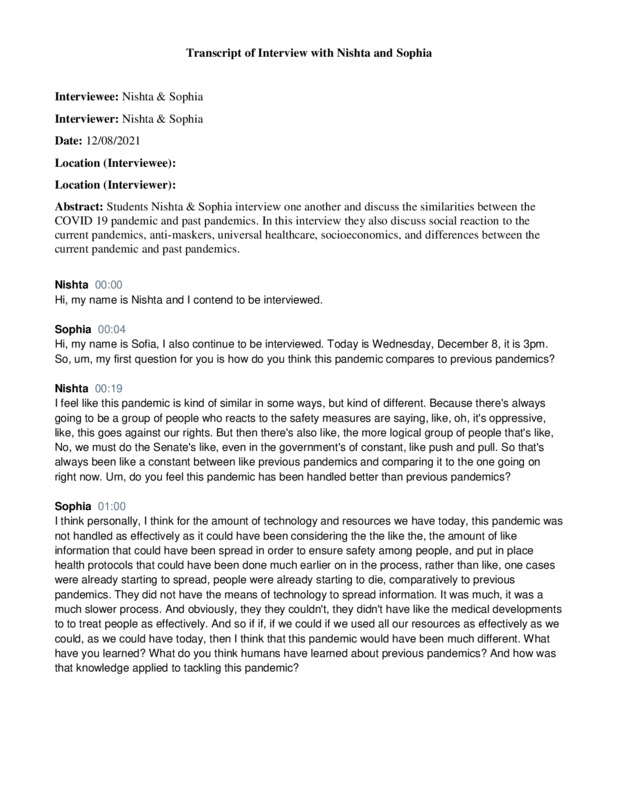
2021-12-08
This interview is about our thoughts and understandings of the Covid-19 pandemic after having taken a semester-long course about the history of pandemics spanning from the black plague until the Spanish flu. We've discussed how we think the world could have handled this pandemic differently, the similarities and differences between this pandemic and previous pandemics, and how this pandemic affected our personal lives.
-
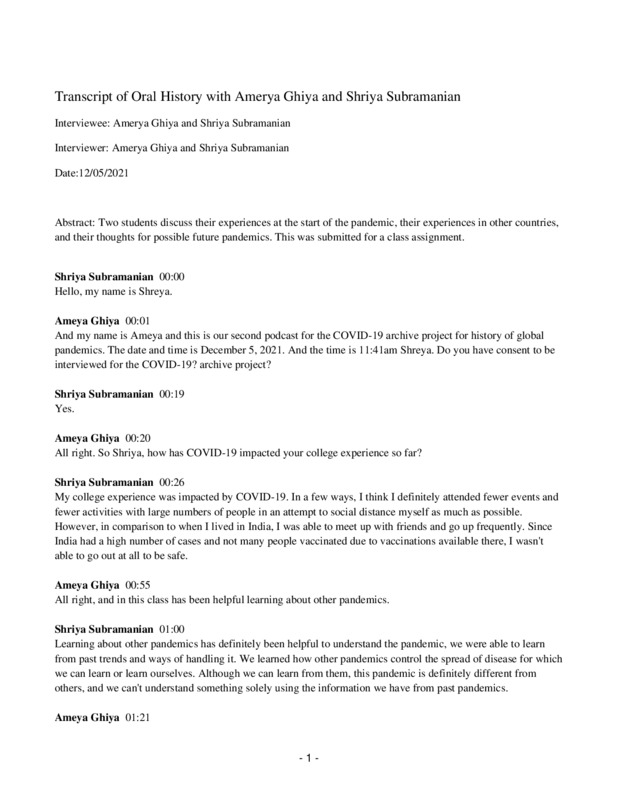
2021-12-05
Two students discuss their experiences at the start of the pandemic, their experiences in other countries, and their thoughts for possible future pandemics. This was submitted for a class assignment.
-
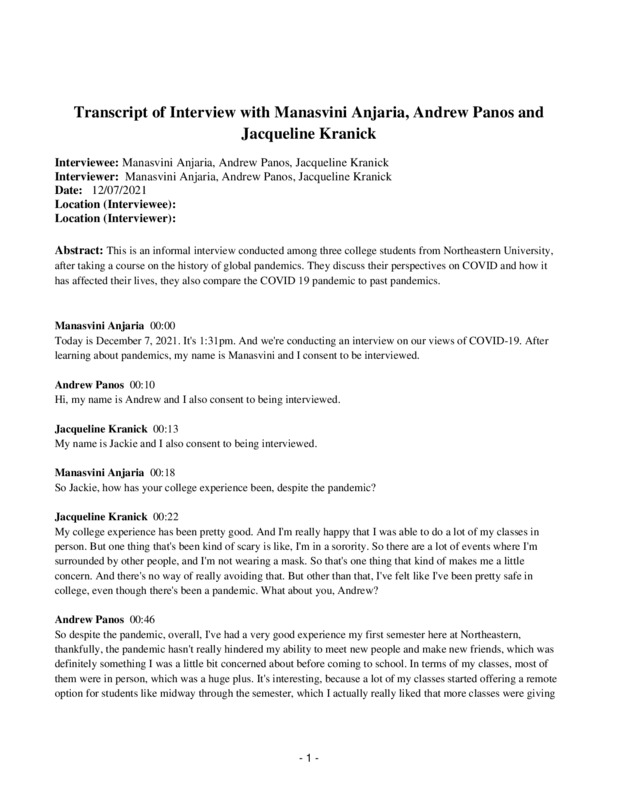
2021-12-07
This is an informal interview conducted among three college students after taking a course on the history of global pandemics on their perspectives on COVID after learning about past pandemics.
-
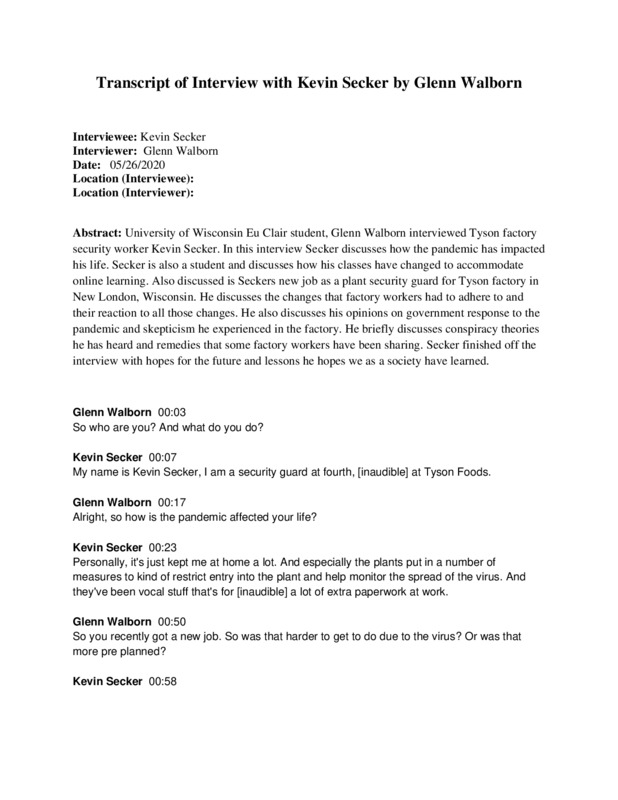
05/16/2020
University of Wisconsin Eu Clair student, Glenn Walborn interviewed Tyson factory security worker Kevin Secker. In this interview Secker discusses how the pandemic has impacted his life. Secker is also a student and discusses how his classes have changed to accommodate online learning. Also discussed is Seckers new job as a plant security guard for Tyson factory in New London, Wisconsin. He discusses the changes that factory workers had to adhere to and their reaction to all those changes. He also discusses his opinions on government response to the pandemic and skepticism he experienced in the factory. He briefly discusses conspiracy theories he has heard and remedies that some factory workers have been sharing. Secker finished off the interview with hopes for the future and lessons he hopes we as a society have learned.
-
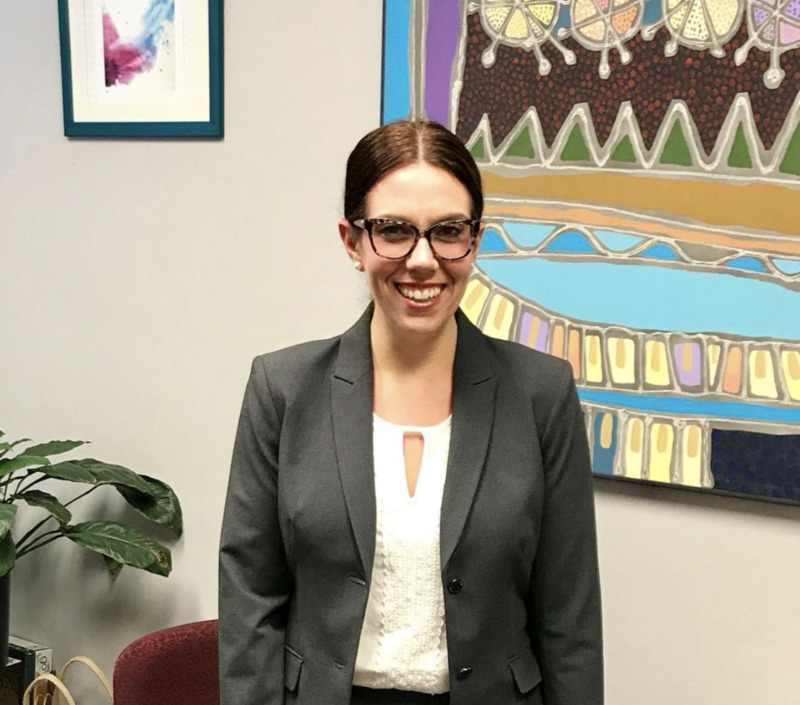
2021-11-03
Through this oral history, Clare Acosta and I develop a conversation about both the Community Engagement office work and the program of Empower: Ecuador. The conversation was specifically focused on the before and after of COVID-19 and also what was learned from the process. It is a very deep conversation that I really enjoyed and know that Clare also did.
-
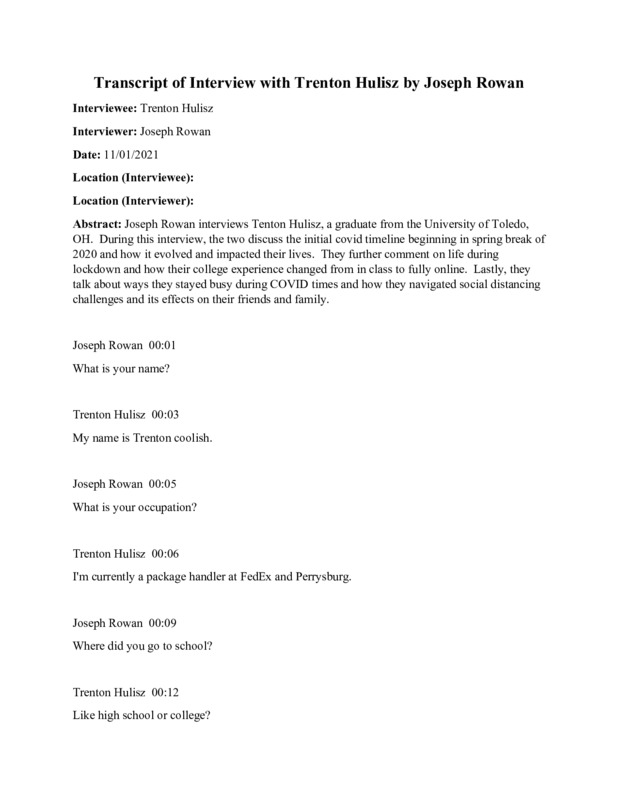
2021-11-01
A college graduate reflects on his career and life and how the COVID-19 pandemic affected his choice to not go to graduate school or pursue a career in psychology.
-
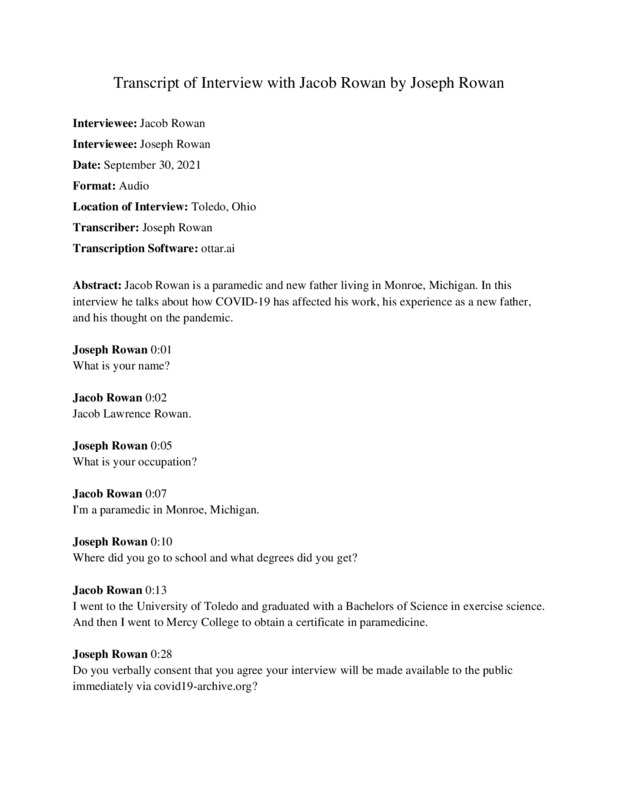
2021-09-30
Paramedic and new father Jacob, talks about his experiences with COVID at the beginning and now end of the pandemic.
-
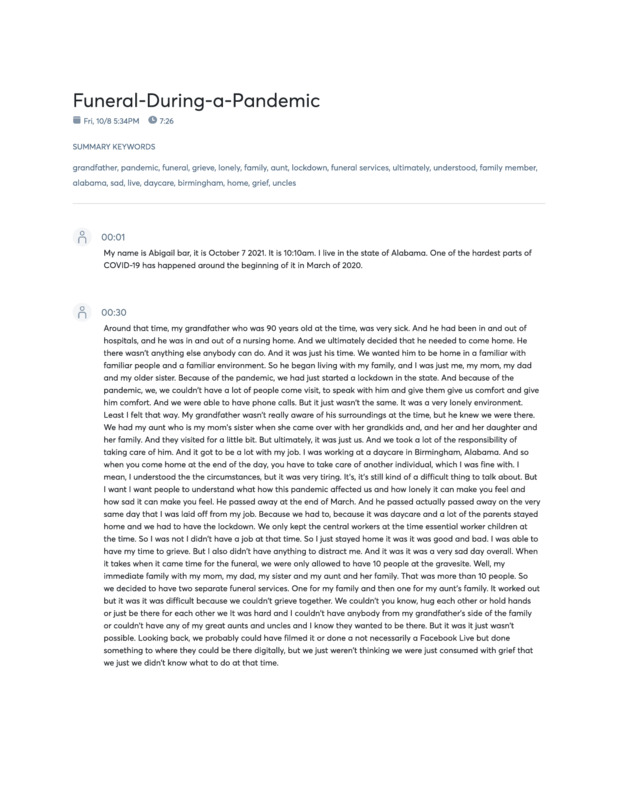
2021-10-07
This audio recording describes my grandfather's funeral at the beginning of the pandemic. It was very difficult because my family couldn't grieve together. We had to have separate services ten people each. We could not have any other family come because we were on lockdown. The whole situation was extremely sad because the pandemic kept our family apart during a difficult time.
-
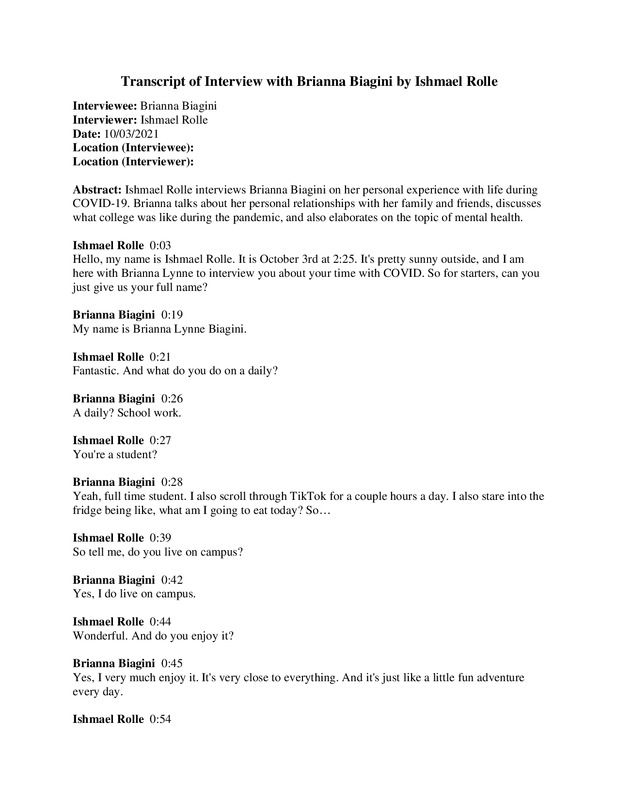
2021-10-03T14:23
-
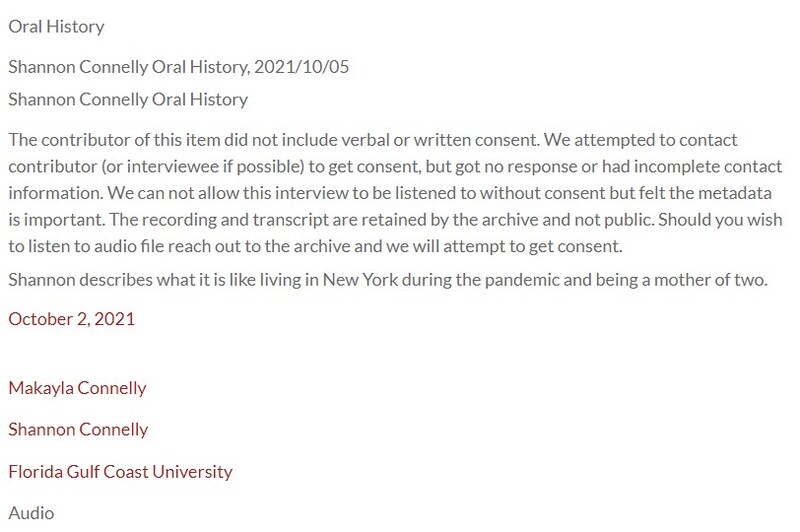
2021-10-02
The contributor of this item did not include verbal or written consent. We attempted to contact contributor (or interviewee if possible) to get consent, but got no response or had incomplete contact information. We can not allow this interview to be listened to without consent but felt the metadata is important. The recording and transcript are retained by the archive and not public. Should you wish to listen to audio file reach out to the archive and we will attempt to get consent.
-
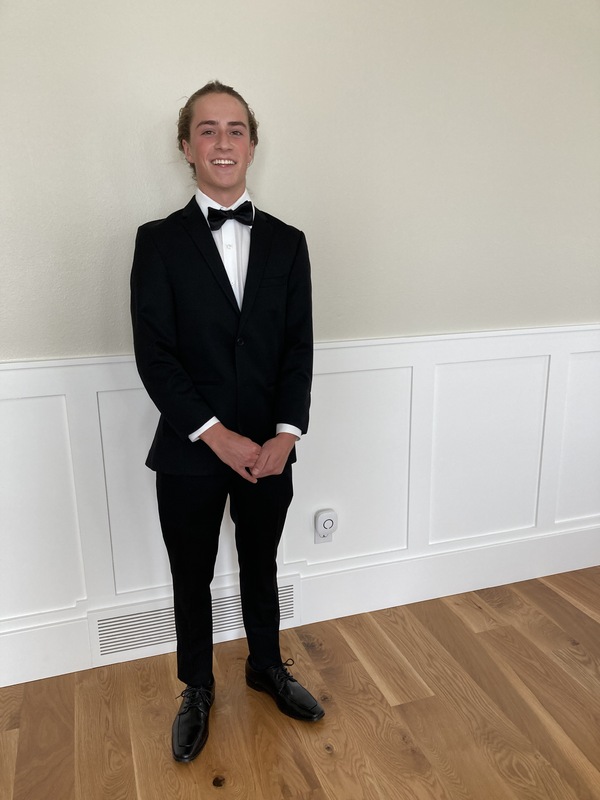
2021-10-05
It was fun to ask my son about his experience during the pandemic. He handled the whole thing really well which comes across in the interview.
I've transcribed the text in the attached Word doc.
-
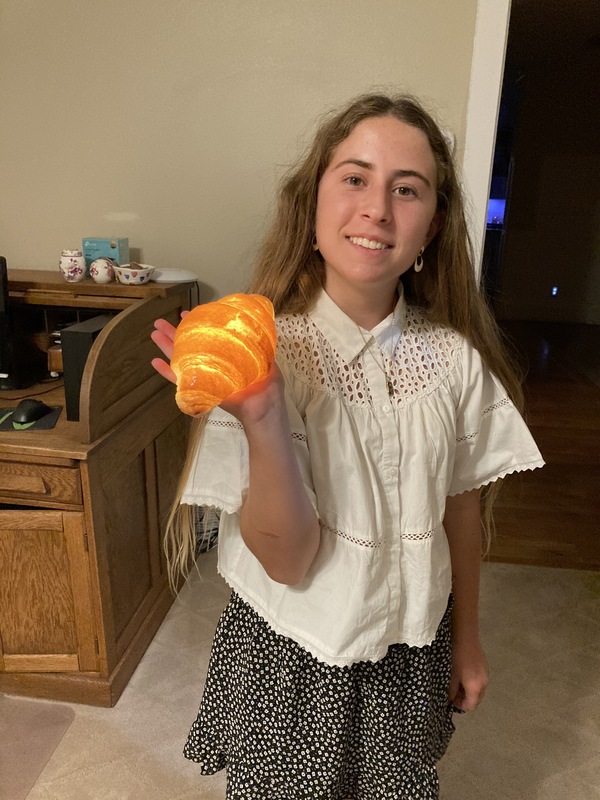
2021-10-05
As her parent, it was interesting to ask my daughter questions about the pandemic and hear her responses. As a family, we were really lucky to stay healthy and be able to spend a lot of extra time together.
I've transcribed the interview in the attached Word file.
-
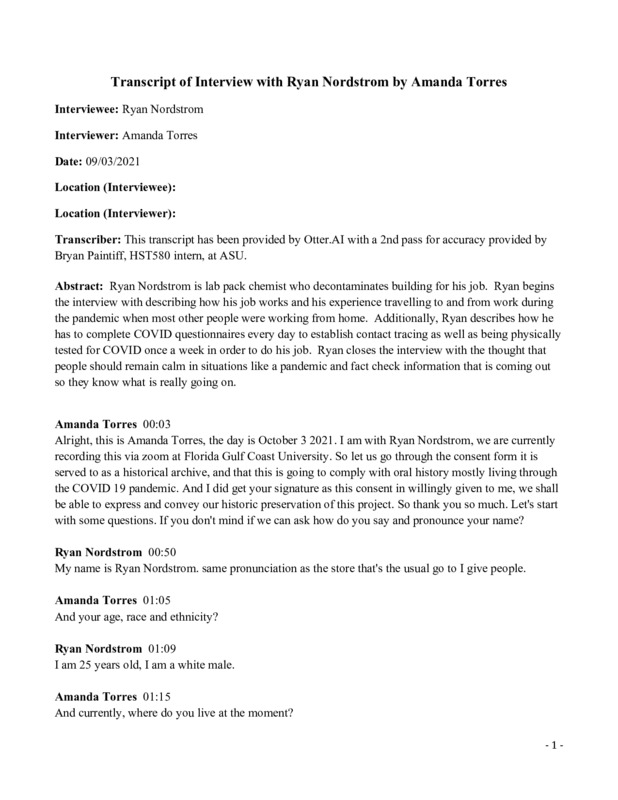
2021-10-03T16:30
I was interviewing the life of a lab pack chemist in Massachusetts during the midst of the Pandemic, from daily routine to personal feelings.
-
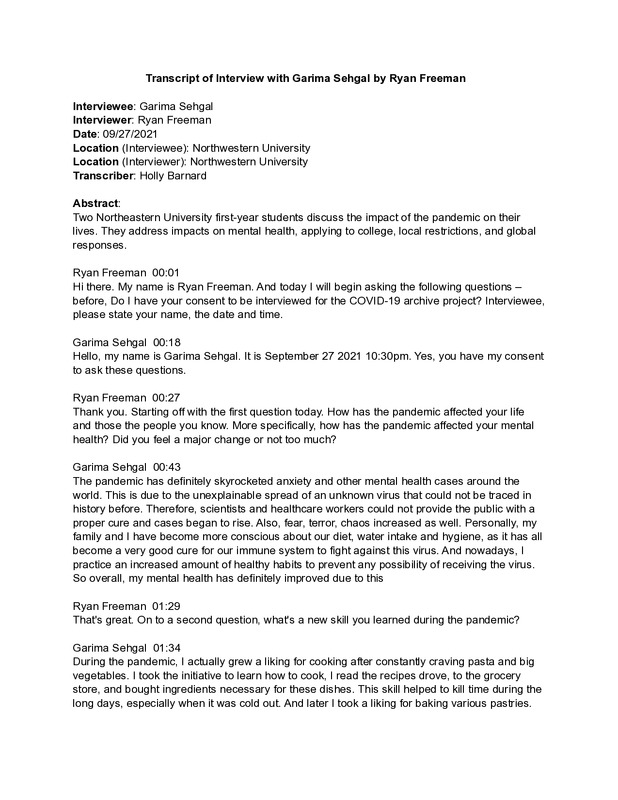
2021-09-27
Two Northeastern students discuss how the pandemic affected their lives, including the impacts of the pandemic on their communities
-
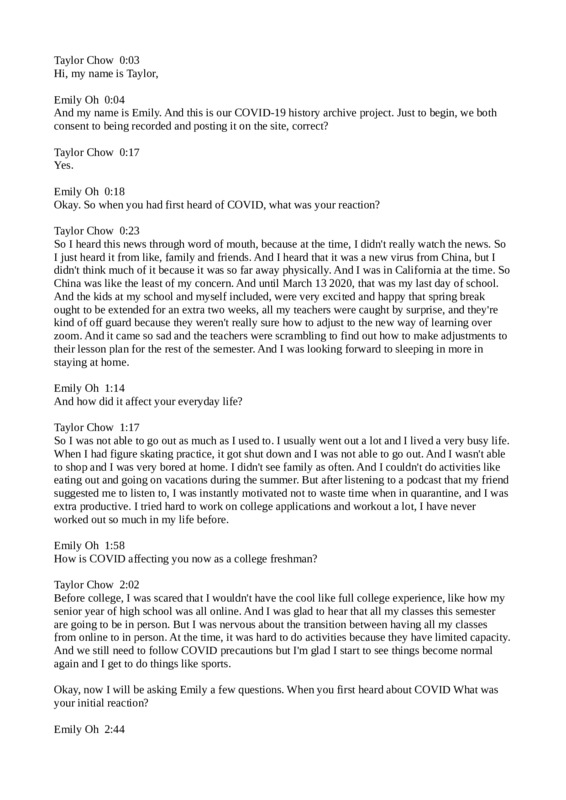
2021-09-24
Two students interview each other about the pandemic and how it affected their life.
-
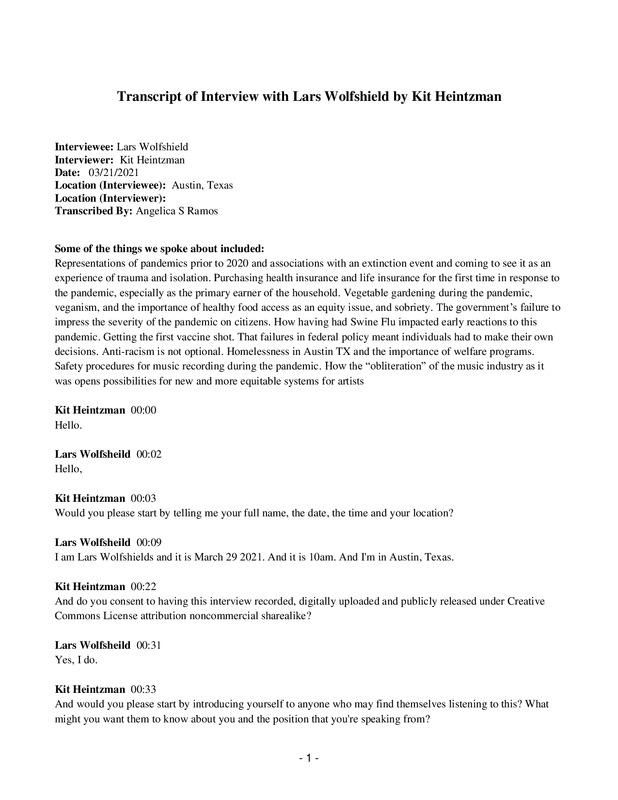
2021-03-29
Self-Description: “I am a pansexual and gender fluid artist and artist manager and I work primarily with Black and queer musicians and bands.” Record label: https://www.instagram.com/wolfshieldrecords/
-
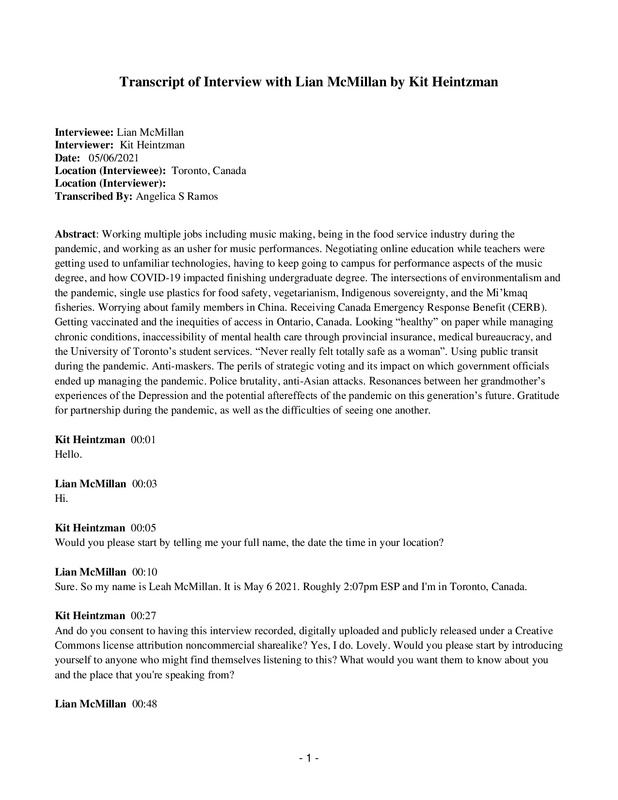
2021-05-06
Self Description: “I’m a 21-year-old musician. I just recently graduated from U[niversity] of T[oronto] a week ago, and I graduated with a classical percussion degree. I play for a band called cutsleeve. We’re a group of east Asian, queer sound musicians. I’m a mixed race woman, my father is white, and my mother is Chinese. I’ve lived in Canada, the [United] States, and I lived in Shanghai for a few years. I’m a dog owner.”
-
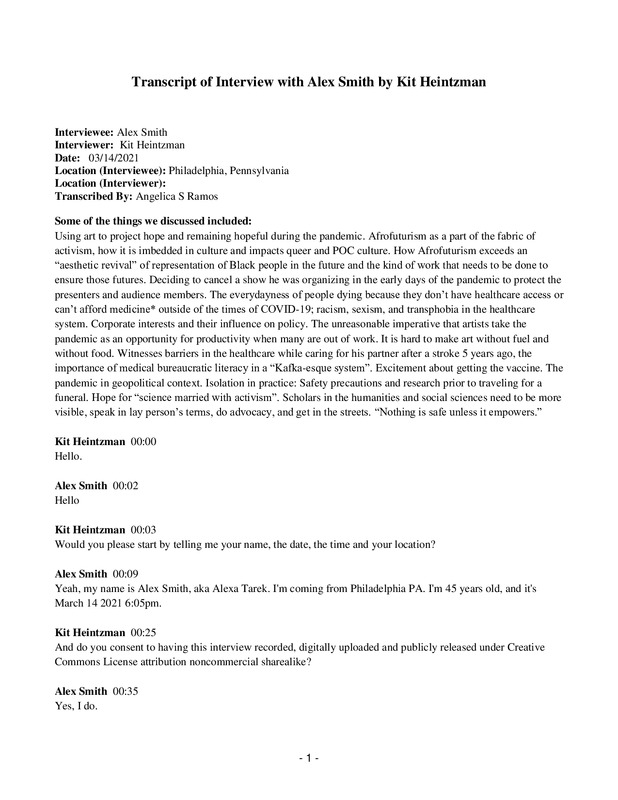
2021-03-14
Self-description: “I’m an artist, writer, musician, and an off-and-on again activist, lecturer, worshopshop leader. I’m coming out of Philadelphia. My work revolves around concepts relating to Afrofuturism; for lack of a better term: superheroes and the conceptual nature of superheroes and the idea of the vigilante and the people’s champions and heroes can walk among us. I use [aesthetics and the immersive ideas of] from science fiction, cyberpunk, solarpunk, biopunk, and Afrofurturism to empower people of color, queer people and to project us into the future and our ideas and culture into the future as well. I use different mediums to do that, my bands Solarized (a sort of noisy punk rock band) and Rainbow Crimes (indie rock, but a little crazier and noisier than many excursions into that). I have written a short story collection called ARKDUST. And I do collage work and soundscapes and curate events like Laser Life, which was a queer sci-fi reading that me and my friends in a collective that I’m in called Metropolarity put together. That’s my praxis right now: a little bit of everything. I view my work as if I’m creating for 18 or 19 or 20 year old Alex, who probably needed some queer Black sci-fi in his life. So, I’m projecting these aspects of myself back to the past to not just nourish my community, but to nourish myself.”
Personal website: alexoteric.com
Other biographical details: Vegetarian, experiences depression, Pew Center for the Arts Fellow, during COVID is the first time in his life he’s had Health Insurance.
Some of our discussion touched on:
Using art to project hope and remaining hopeful during the pandemic.
Afrofuturism as a part of the fabric of activism, how it is imbedded in culture and impacts queer and POC culture. How Afrofuturism exceeds an “aesthetic revival” of representation of Black people in the future and the kind of work that needs to be done to ensure those futures.
Deciding to cancel a show he was organizing in the early days of the pandemic to protect the presenters and audience members.
The everydayness of people dying because they don’t have healthcare access or can’t afford medicine* outside of the times of COVID-19; racism, sexism, and transphobia in the healthcare system.Corporate interests and their influence on policy.
The unreasonable imperative that artists take the pandemic as an opportunity for productivity when many are out of work. It is hard to make art without fuel and without food.
Witnesses barriers in the healthcare while caring for his partner after a stroke 5 years ago, the importance of medical bureaucratic literacy in a “Kafka-esque system”.
Excitement about getting the vaccine.
The pandemic in geopolitical context.
Isolation in practice: Safety precautions and research prior to traveling for a funeral.
Hope for “science married with activism”.
Scholars in the humanities and social sciences need to be more visible, speak in lay person’s terms, do advocacy, and get in the streets.
“Nothing is safe unless it empowers.”
Other cultural references: Netflix, Zombie Movies, Sabrina the Teenage Witch, Oprah’s interview with Meghan Markle and Prince Harry, Black Panther, Teenage Bounty Hunter, Elon Musk, GoFundMe.
A specific reference is made to the need for his sister’s sickle cell anemia medicine in this interview. She dies a few months later. The GoFundMe to cover funeral expenses can be found here: https://www.gofundme.com/f/memorial-fund-for-elizabeth-graham?utm_campaign=p_cp_url&utm_medium=os&utm_source=customer
-
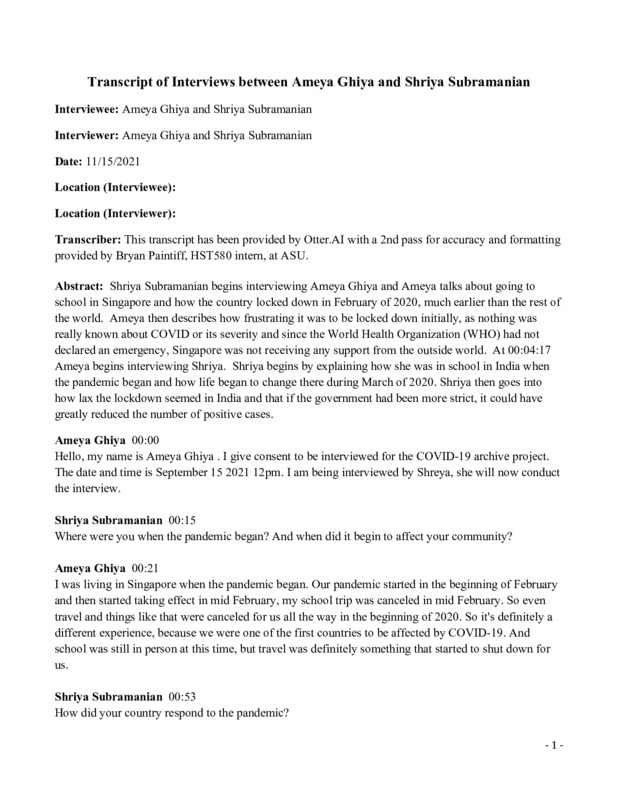
2021-09-15
[Curator's Note] Two persons interview each other about their experiences during the COVIS-19 pandemic. They both lived in different countries when the pandemic started, as one of them lives in Singapore and the other in India.
-
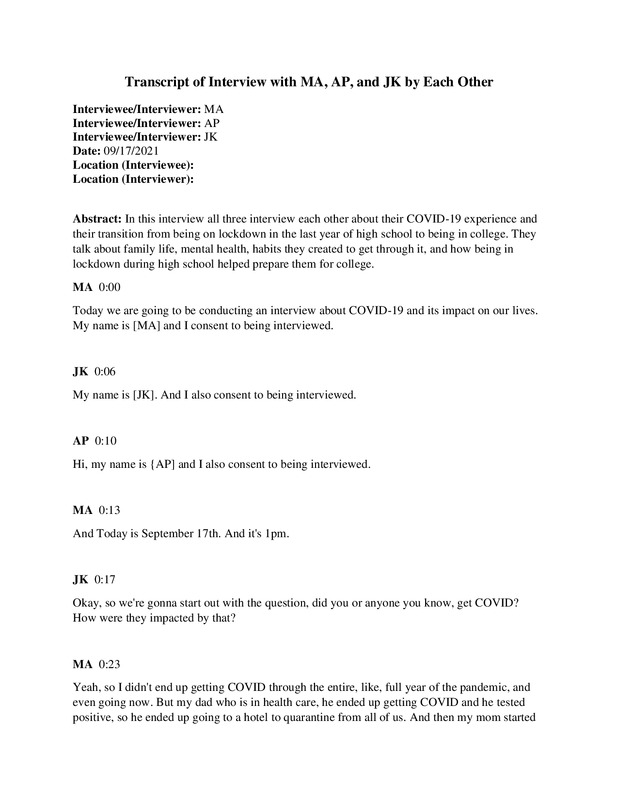
2021-09-17
This is a casual interview about the effects of COVID on mental health, academics, family life, etc. We discuss the biggest impact COVID had on us, our experience with the pandemic, what we did over quarantine, and much more, from the perspective of college freshmen.
-
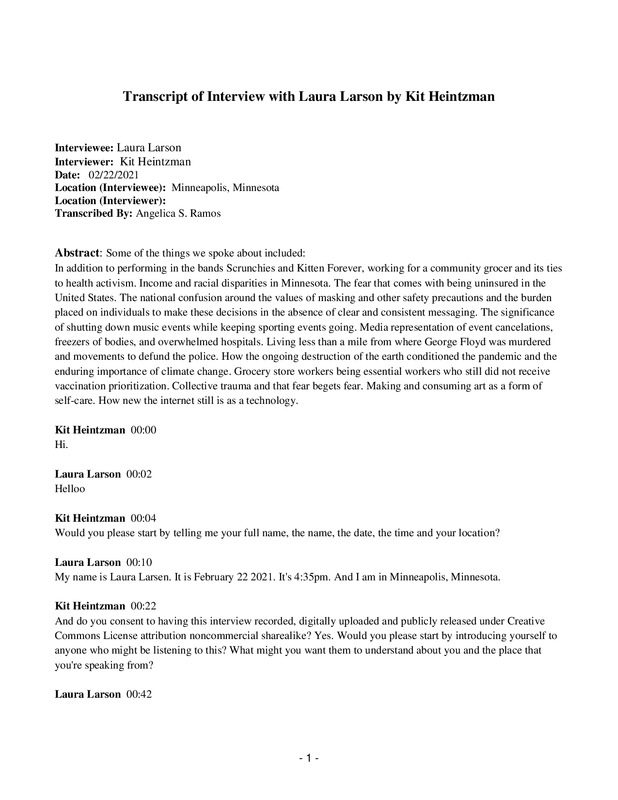
2021-02-21
Self description: “My name is Laura, and I am in two bands right now. I am in a band called Scrunchies and a band called Kitten Forever. I play guitar, base, drums, and I sing in those two bands. I live in Minneapolis, Minnesota. For work, I work at a community cooperative grocery store, in an administrative position, but one that is community outreach based and have a lot to do with meeting and coordinating with our community partners, a lot of the work that I do is about mutual aid, and helping out the community with the resources that we have available to us. Besides that I am a visual artist, I like to paint, I like to draw, I like to read books, and I live in a little duplex with my partner and our cat Sissy.”
Some of the things we spoke about included:
- In addition to performing in the bands Scrunchies and Kitten Forever, working for a community grocer and its ties to health activism.
- Income and racial disparities in Minnesota.
- The fear that comes with being uninsured in the United States.
- The national confusion around the values of masking and other safety precautions and the burden placed on individuals to make these decisions in the absence of clear and consistent messaging.
- The significance of shutting down music events while keeping sporting events going.
- Media representation of event cancelations, freezers of bodies, and overwhelmed hospitals.
- Living less than a mile from where George Floyd was murdered and movements to defund the police.
- How the ongoing destruction of the earth conditioned the pandemic and the enduring importance of climate change.
- Grocery store workers being essential workers who still did not receive vaccination prioritization.
- Collective trauma and that fear begets fear.
- Making and consuming art as a form of self-care.
- How new the internet still is as a technology.
Cultural references: Save Our Stages, The Atlantic article “Cancel Everything”.
See also:
https://scrunchies.bandcamp.com/
https://kittenforever.bandcamp.com
-

2021-03-31
Self-Description: “My name is Gyre. I am a multidisciplinary artist based in South Africa with global ambitions. I specialize in music, but I also work as a freelance writer as well as in dance. I’m a dancer learning to choreograph. Political commentator, particularity with regard to the LBGTQA+ community. I identify as queer. I am homoromatic and homosexual at this point in my life. You never know honey, it’s a spectrum. I had my first venture into artistic expression that is rooted in queer rights and queer understanding and queer theory, was my debut album, titled Queernomics, which was a documented audio-visual book about the contemporary experiences of a Black queer South African male, and that has gotten me into the positions that I express myself in, both out of passion and out of profession. Inkosi Yenkonkoni, which means “The Gay King”, in my native language which is Zulu.”
Other details available here:
Works produced during the pandemic: Kithi, International LGBTQ+ Rights Festival, writing on football.
Some of the things we spoke about included:
“What happens at the top is just politics, what happens at the bottom is real life.”
Thinking about the term “pandemic”
Listening to the body
The pandemic exposing state corruption
Having written a song called “Quarantine” in 2018
The inadequacies and privileges of Medical Aid in South Africa, having aged out of Medical Aid before COVID, the personal impact of worse-health insurance during pandemic, the importance of demonetizing health care
Pre-COVID keeping busy: organizing, walking, collaborating
Transit during COVID, sub/urban and outskirt disparities
Canceling shows and taking dance classes and rethinking what it means to be productive
Global Americanization and the impact of Trump’s pandemic denialism on South African health
Moving out of disbelief about the severity of COVID after losing a loved one in the first wave
Gratitude for the global influence of the Black Lives Matter movement, and sadness that tragedy in the diaspora brings neocolonialism to the fore
The importance of social media for queer counter-violence and activist fractures among LGBTQA+
Feeling allyship with the #metoo movement
How homophobia intersects with everyday altercations about social distancing
The anxieties of hooking up during the pandemic
The importance that scientists learn to speak in lay terms about climate change and vaccines
Existence as resistance and creating art
“Spread love not tolerance”
Other cultural references include: Trans Day of Visibility, astrology, and the TV series Pose.
-

2021-03-08T12:38
Self-description: “Audio visual artist that lives in Seattle, Washington, specifically in the realm of music and film, and also the intersection of the two. A lot of my work involves amplifying experiences and voices that are often underrepresented, primarily in the Black and LBGTQ+ community. And that’s something that overtime my work has been diving deeper and deeper into over the years, which is something that I think as an artist, I’ve only really come to terms with in the last few years. But it’s been definitely both empowering for me and illuminating to see it reflected back in the ways that people have responded to the work.” Other biographical details: late 20s, from Los Angeles.
Some of the things we discussed include:
The dysphoric experience of Black artists filtered through white talking points.
Unstable work and income as an artist--audio and visual--pre- and mid-pandemic. 2019 was the first year that work as an artist and in performance communities was stable. Releasing the album Fuck Danny Denial in 2020 (https://dannydenial.bandcamp.com/album/fuck-danny-denial).
Pandemic specific economic penalties of musicians in the case of live streams for Seattle Pride and Folsom Street Fair.
The burden on artists to make ethical calls about canceling performances in the early stages of the pandemic, and needing to wear “new hats”, like health safety inspector.
The pandemic as a shared experience of stoppage, and the need for adaptation.
Aging and changing awareness about one’s needs for health care.
Working to build equitable opportunities for artists. Since 2015-2019 doing gigs and video projects on contracts.
Media outlets’ poor representations of the summer protests, acts of civil disobedience, and the autonomous zone in Seattle.
Funding the serial project Bazooka (http://web.archive.org/web/20210622155802/https://ca.gofundme.com/f/dannydenialbazzooka)
The ethical decisions associated with wanting to participate in amplifying and uplifting the BLM movement without exploitation for personal gain, engaging as a citizen.
Witnessing a friend’s experience of hospitalization due to COVID-19.
The value in studying patterns of human friendships and how the pandemic disrupted the conditioning of existence and the importance of local histories of resistance in Seattle.
Cultural references: Pan’s Labyrinth, Smash Mouth’s super spreader event, Portland International Film Festival, The Tape Deck Podcast, Punk Black, Darksmith, Taco Cat, Alice and Chains, Duff McKagan, Pearl Jam, MoPOP, Shaina Shepherd, and TheBlackTones.
-
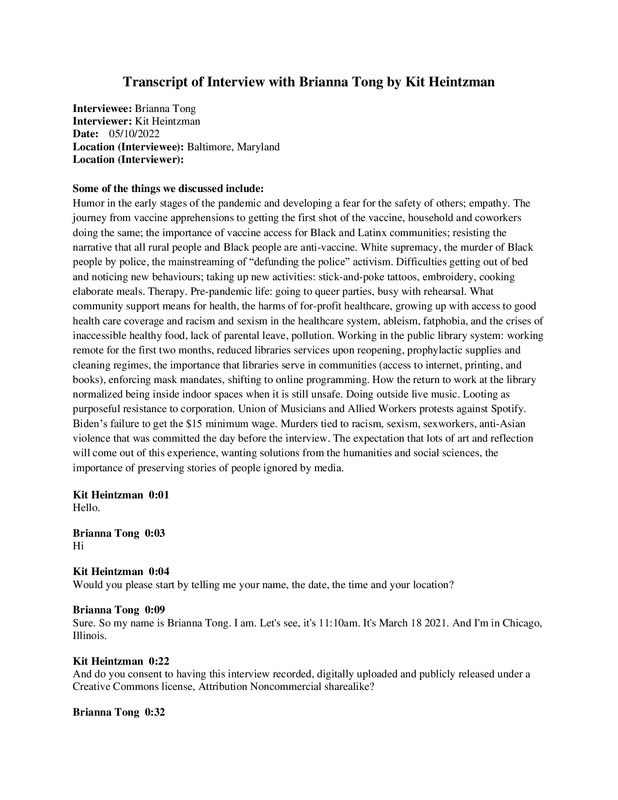
2021-03-18
Self description: “I am sitting in my bed right now as I’ve done for a lot of this quarantine. In regular times and I guess still now, I’m in three bands and I also work at the library, the public library. So I’ve been working there in person since we came back to work in May. I was contacted for this interview through Bussy Kween Power Trip, which is a Black queer punk band with three people, no guitars, so my close friends. I’m in two other bands. One band is called Je’raf and one is called Cordoba. And one person each from Bussy Kween is in each of those bands. Haven’t played a show in forever. I can give a little about what I look like or am like. I’m a woman. I’m 26, almost 27 I guess. I’m Black and Asian. I’m kinda short. And during this pandemic I’ve been in general super lucky to have a job still and a great living situation. And I met my partner right before the pandemic, so we’ve been chilling a lot and that’s been amazing. She is so great. Yeah, just going to work and working on all kinds of things in my home. And sometimes having the energy to do a bunch of music and crafts and other art things, and sometimes laying in bed for a full day.”
-
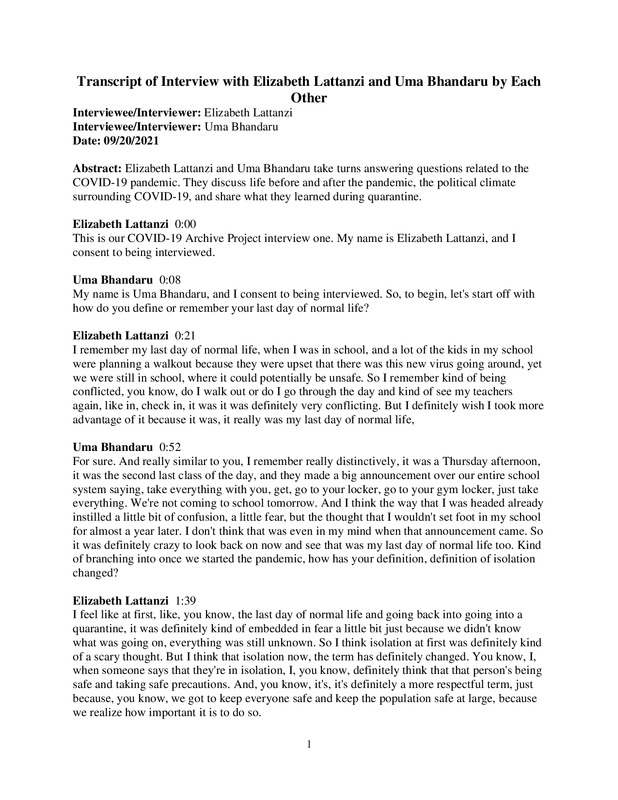
2021-09-20
-
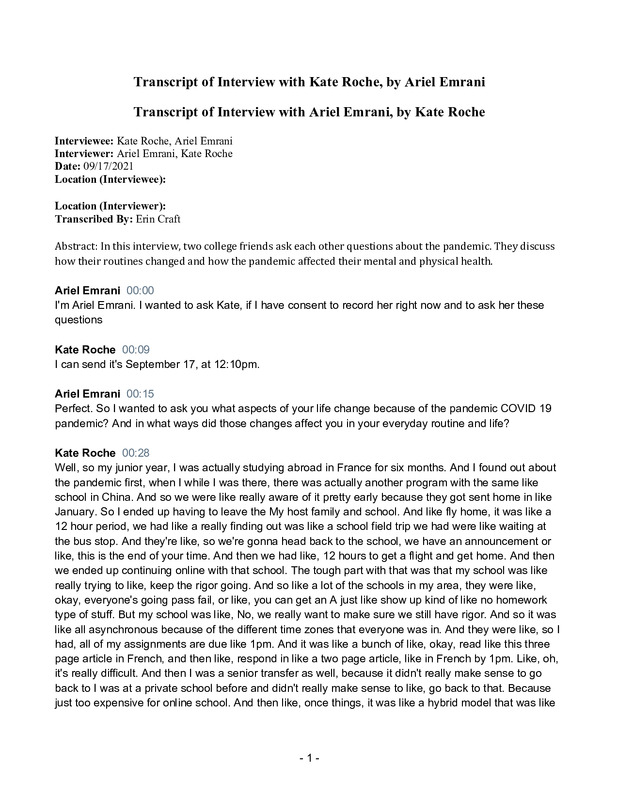
2021-09-17
This audio file shares two perspectives and personal stories about the pandemic.
-
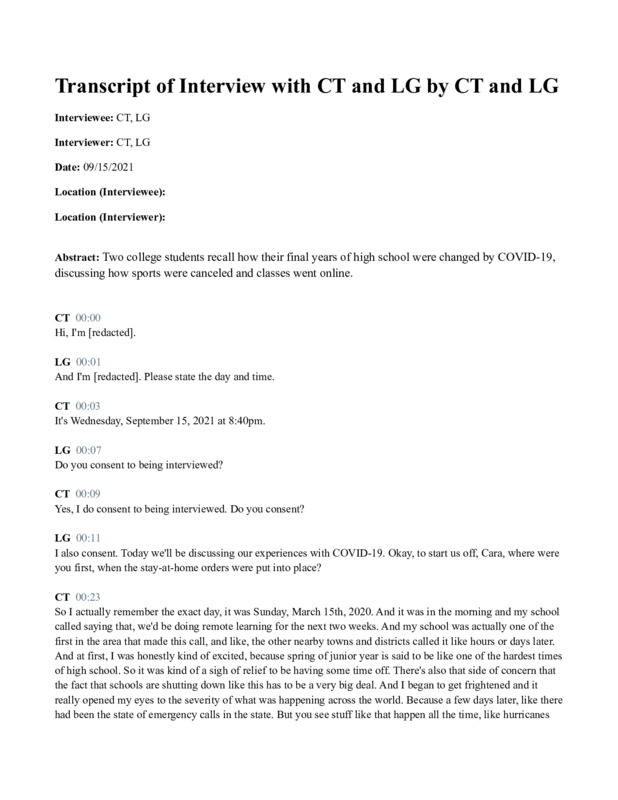
2021-09-15
Two college students recall how their final years of high school were changed by COVID-19, discussing how sports were cancelled and classes went online.
-
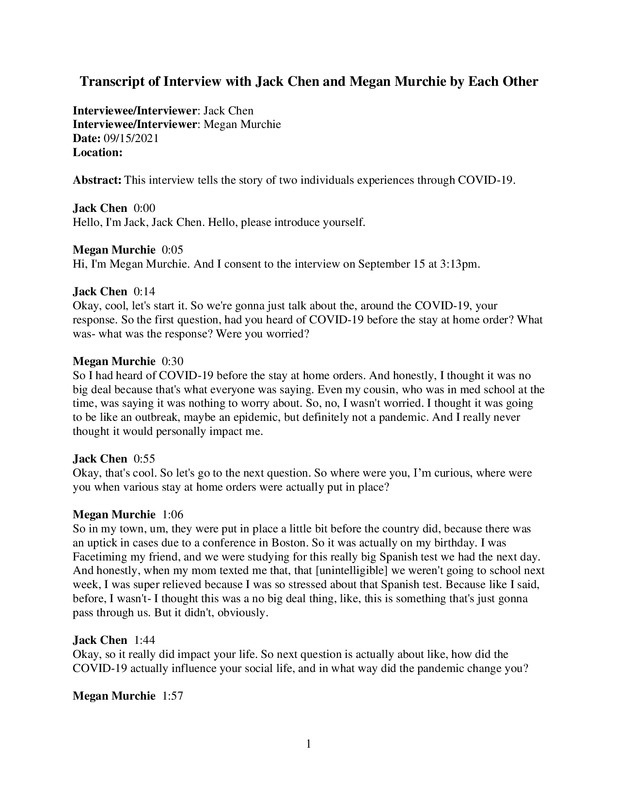
2021-09-15
This podcast tells the story of two individuals experiences through COVID-19.
-
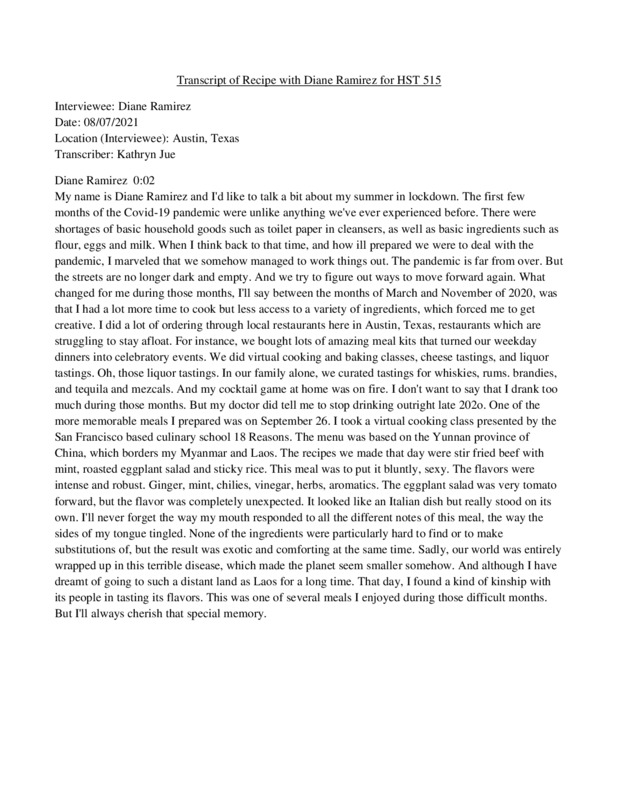
2021-08-07
How one Hispanic female dealt with the cooking challenges that took place in the early months of the pandemic. In particular, one meal she prepared on September 26, 2020.
 2022-01-19
2022-01-19 2021-11-28
2021-11-28 2020-12-02T14:08
2020-12-02T14:08 2021-11-27
2021-11-27 11/15/2020
11/15/2020 12/11/2020
12/11/2020 2021-07-05
2021-07-05 2021-04-14
2021-04-14 2021-03-05T16:05
2021-03-05T16:05 2021-03-11
2021-03-11 2021-05-05
2021-05-05 2021-03-26
2021-03-26 2021-04-21
2021-04-21 2021-03-15
2021-03-15 2021-04-08
2021-04-08 2021-05-07
2021-05-07 2021-05-12
2021-05-12 2021-03-23
2021-03-23 2021-12-13T10:15:01
2021-12-13T10:15:01 2021-12-11
2021-12-11 2021-12-08
2021-12-08 2021-12-08
2021-12-08 2021-12-05
2021-12-05 2021-12-07
2021-12-07 05/16/2020
05/16/2020 2021-11-03
2021-11-03 2021-11-01
2021-11-01 2021-09-30
2021-09-30 2021-10-07
2021-10-07 2021-10-03T14:23
2021-10-03T14:23 2021-10-02
2021-10-02 2021-10-05
2021-10-05 2021-10-05
2021-10-05 2021-10-03T16:30
2021-10-03T16:30 2021-09-27
2021-09-27 2021-09-24
2021-09-24 2021-03-29
2021-03-29 2021-05-06
2021-05-06 2021-03-14
2021-03-14 2021-09-15
2021-09-15 2021-09-17
2021-09-17 2021-02-21
2021-02-21 2021-03-31
2021-03-31 2021-03-08T12:38
2021-03-08T12:38 2021-03-18
2021-03-18 2021-09-20
2021-09-20 2021-09-17
2021-09-17 2021-09-15
2021-09-15 2021-09-15
2021-09-15 2021-08-07
2021-08-07